Air Conditioning
Quick 30-Minute Guide to Air Conditioning Heat Pump Maintenance
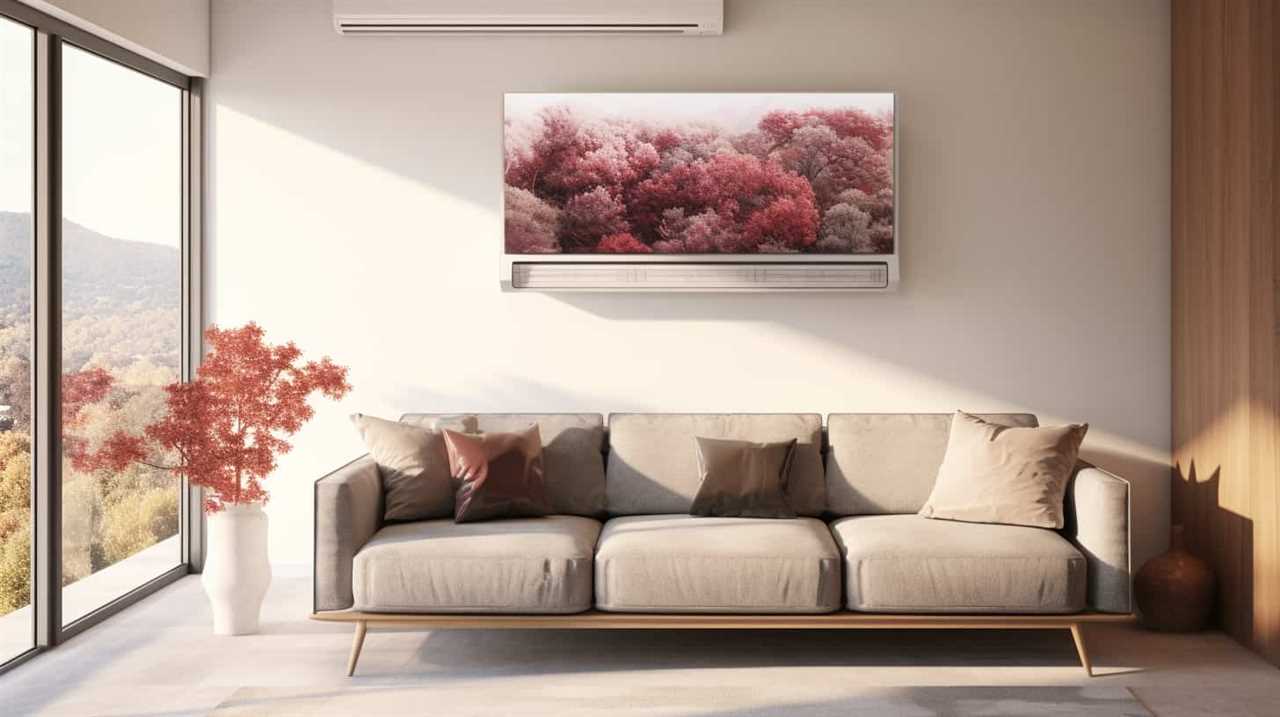
Are you fed up with sweating during the summer? Don’t worry! We have a simple and effective solution for your air conditioning heat pump problems.
In just 30 minutes, you can perform essential maintenance tasks to keep your unit running smoothly and efficiently. From cleaning air filters to inspecting coils, we’ve got you covered.
So grab your tools and let’s get started on your path to a cool and comfortable home.
Key Takeaways
- Regular maintenance is crucial for optimal functioning and longevity of air conditioning heat pumps.
- Cleaning and replacing air filters regularly improves system performance and prevents issues.
- Checking and cleaning the outdoor unit prevents common issues and ensures sufficient cooling.
- Inspecting and cleaning indoor coils ensures optimal performance and air quality.
Importance of Regular Maintenance
Regular maintenance is crucial for us to ensure the optimal functioning and longevity of our air conditioning heat pumps. Skipping maintenance can result in costly repairs and decreased energy efficiency.
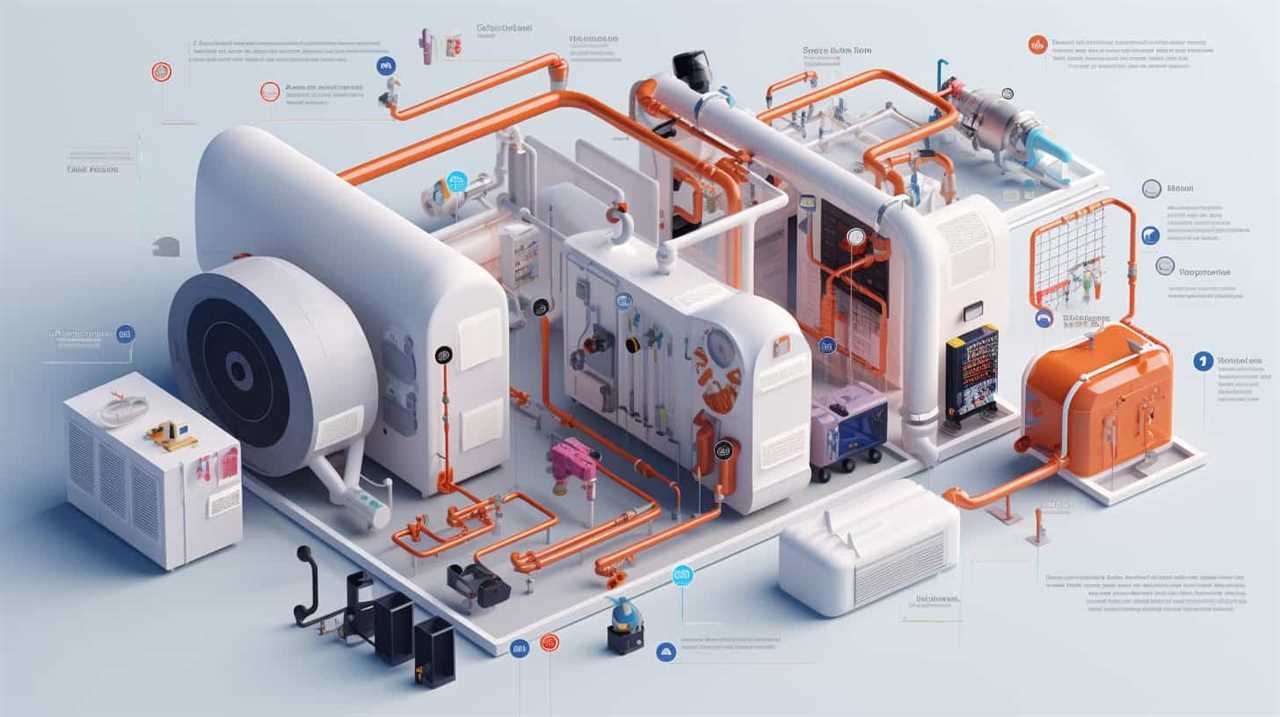
One common mistake is neglecting to schedule regular check-ups with a professional technician. These check-ups allow for early detection of any potential issues and help prevent major breakdowns.
Another mistake is failing to clean and replace air filters regularly. Dirty filters restrict airflow, leading to poor indoor air quality and reduced system performance.
Inadequate maintenance can also cause the heat pump to work harder, resulting in increased energy consumption and higher utility bills. By addressing these common maintenance mistakes and regularly cleaning the air filters, we can ensure that our air conditioning heat pumps operate efficiently and effectively.
Now let’s delve into the process of cleaning the air filters.
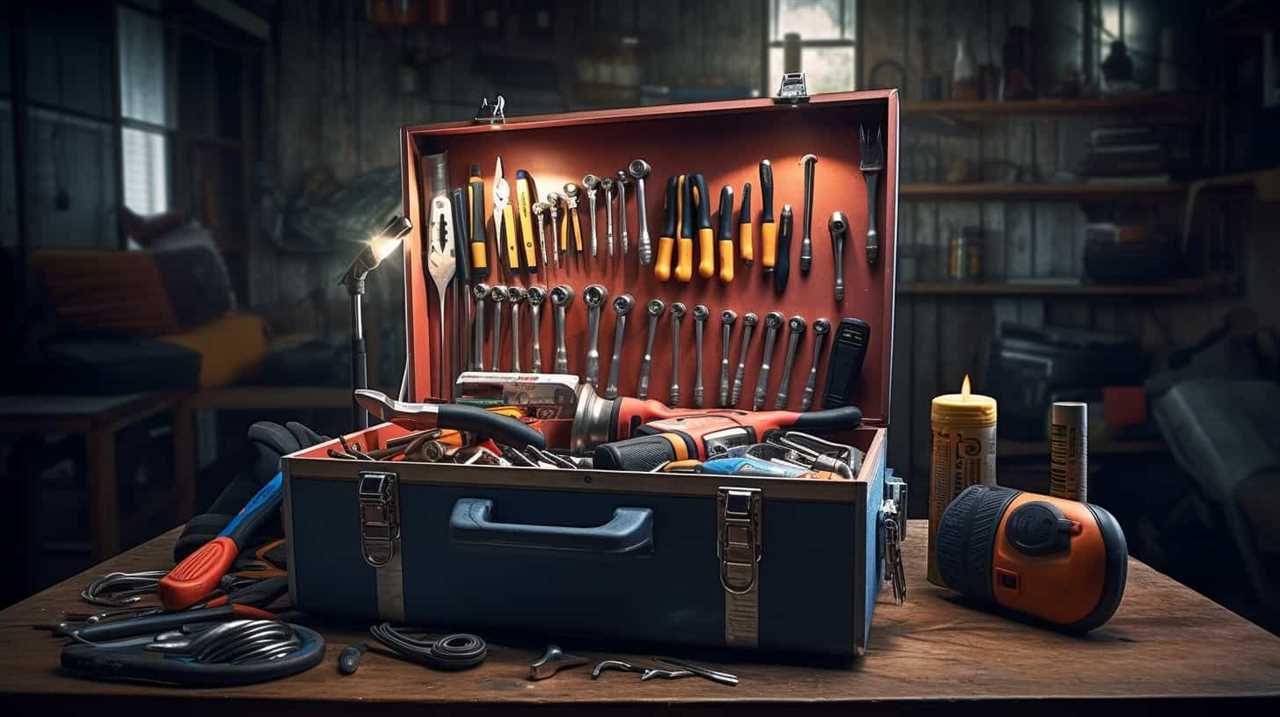
Cleaning the Air Filters
To keep our air conditioning heat pumps running efficiently, we should regularly clean the air filters and remove any accumulated dust and debris. Cleaning the air filters is a crucial step in maintaining the performance and longevity of our heat pumps.
Over time, air filters can become clogged with dirt, pollen, and other particles, obstructing the airflow and reducing the efficiency of the system. By removing debris from the air filters, we can ensure that the heat pump operates at its optimal level, providing us with cool and clean air. Not only does this improve air quality, but it also helps to prevent potential issues such as frozen coils or overheating.
Now that we’ve cleaned the air filters, let’s move on to the next step: checking and cleaning the outdoor unit.
Checking and Cleaning the Outdoor Unit
Let’s start by inspecting and cleaning the outdoor unit to ensure its proper functioning. The outdoor unit plays a crucial role in the heat pump system, as it houses the compressor and condenser coils. Over time, debris such as dirt, leaves, and grass can accumulate on the unit, hindering its performance. To prevent common outdoor unit issues, it is important to regularly check and clean it. Here are a few troubleshooting tips to help you maintain your outdoor unit:
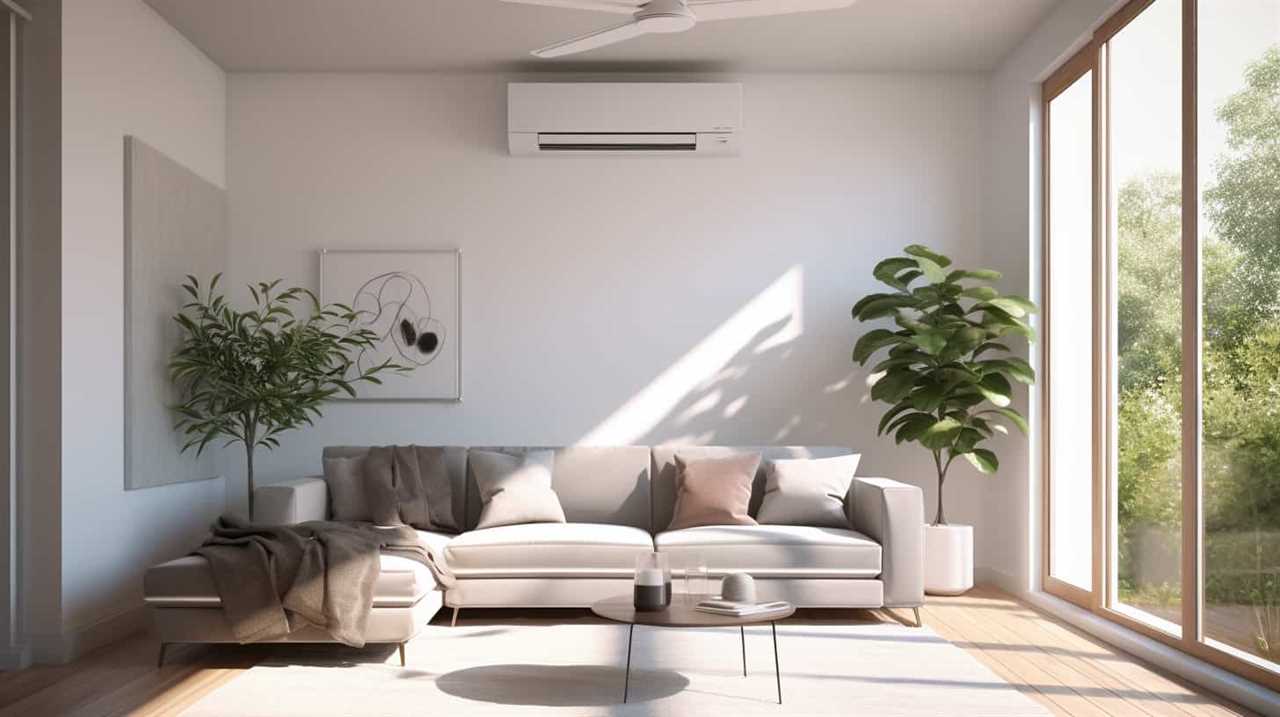
| Common Issues | Possible Causes | Solutions |
|---|---|---|
| Insufficient cooling | Dirty condenser coils | Clean the coils |
| Strange noises | Loose fan blades | Tighten fan blades |
| Unit not turning on | Faulty capacitor | Replace the capacitor |
Inspecting and Cleaning the Indoor Coils
Occasionally, we need to inspect and clean the indoor coils to ensure optimal performance of our air conditioning heat pump system. Here are some cleaning techniques and coil maintenance tips to help you keep your system running smoothly:
-
Turn off the power: Before starting any maintenance, make sure to turn off the power to the unit to avoid any accidents.
-
Remove debris: Gently brush away any visible dirt or debris from the coils using a soft brush or vacuum cleaner.
-
Clean with a coil cleaner: Apply a commercial coil cleaner to the coils, following the manufacturer’s instructions. This will help remove any stubborn dirt or grime.

-
Rinse with water: Use a hose or a spray bottle to rinse the coils with water, making sure to remove all traces of the cleaner.
-
Dry thoroughly: Allow the coils to air dry completely before turning the power back on.
Lubricating Moving Parts
We can lubricate the moving parts of our air conditioning heat pump system to ensure smooth operation and minimize friction. By regularly lubricating these parts, we can prevent rust and reduce friction, which can lead to increased efficiency and prolong the lifespan of our system. The table below provides a list of the key moving parts that require lubrication and the recommended lubricant to use:
| Moving Part | Recommended Lubricant |
|---|---|
| Fan Motor | Electric Motor Oil |
| Blower Motor | SAE 20 Oil |
| Bearings | Grease |
| Pulleys and Belts | Belt Dressing Spray |
Testing and Calibrating Thermostat
When it comes to maintaining an air conditioning heat pump, proper thermostat calibration is essential. We need to ensure that the thermostat is accurately reading and controlling the temperature in the space.
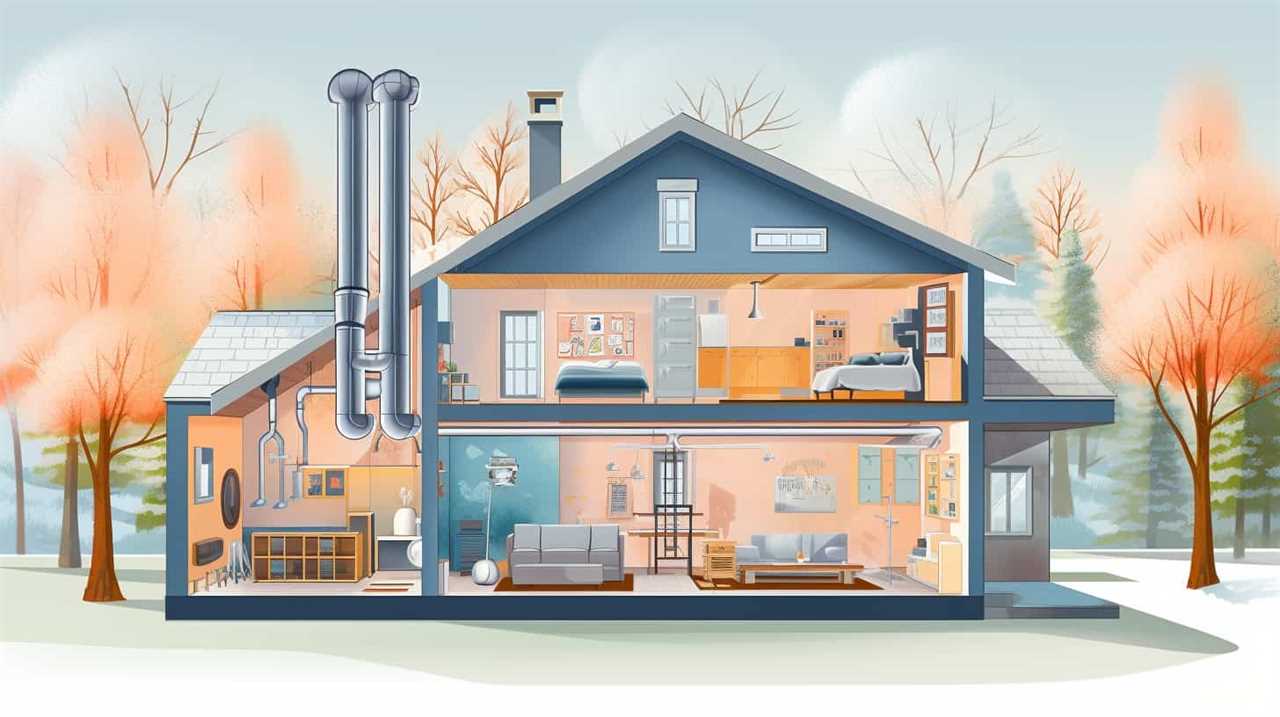
Testing the thermostat functionality is crucial to identify any issues and make necessary adjustments.
Regular maintenance of the thermostat is of utmost importance to ensure optimal performance and energy efficiency of the HVAC system.
Proper Thermostat Calibration
Let’s start by testing and calibrating the thermostat to ensure proper functionality. A correctly calibrated thermostat is crucial for maintaining the desired temperature and maximizing energy efficiency.
Here are some steps to follow for proper thermostat calibration:
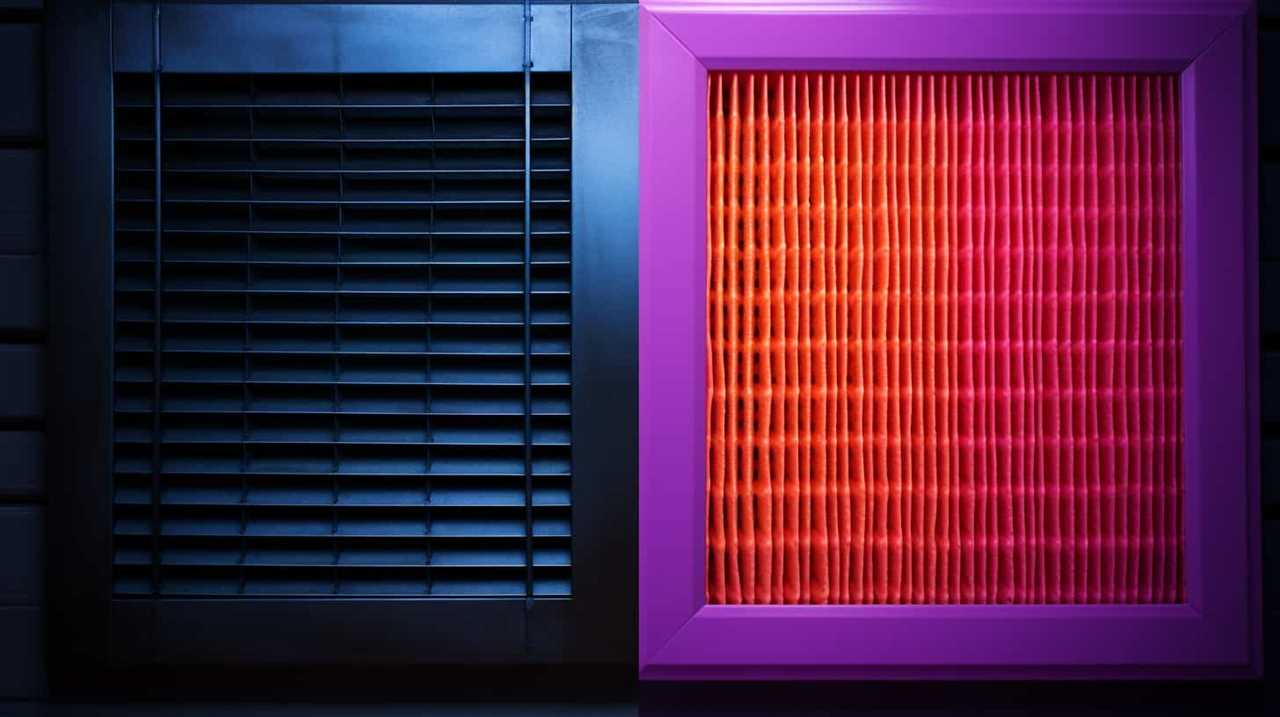
- Check the temperature accuracy by comparing the thermostat reading with a separate thermometer.
- Verify that the thermostat is level to ensure accurate temperature sensing.
- Clean the thermostat’s interior components, including the bimetallic coil and contacts, to remove any dirt or debris that may affect its performance.
- Test the thermostat’s programming capabilities to ensure it can accurately follow the desired temperature schedule.
- Consider upgrading to a programmable thermostat for added convenience and energy savings.
By calibrating the thermostat, you can prevent temperature inconsistencies and potential HVAC system malfunctions.
Now, let’s move on to testing the overall functionality of the thermostat.
Testing Thermostat Functionality
To ensure the proper functionality of the thermostat, it’s important to test and calibrate it. Thermostat troubleshooting is an essential step in maintaining a comfortable indoor environment.
Start by checking the thermostat settings to ensure they’re correctly programmed. If the temperature displayed on the thermostat doesn’t match the actual room temperature, it may need recalibration. Use a separate thermometer to compare the readings. If there’s a discrepancy, refer to the manufacturer’s instructions to calibrate the thermostat accordingly.
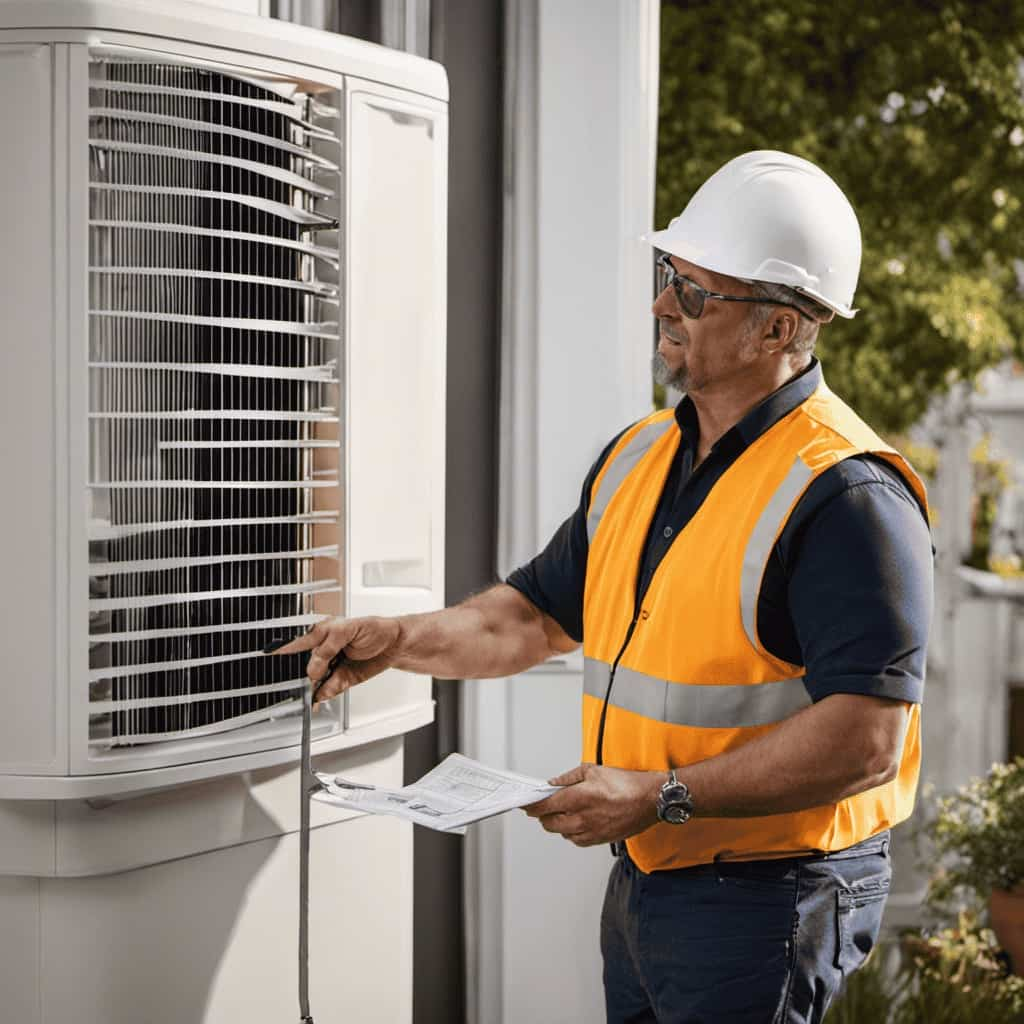
Additionally, test the thermostat by adjusting the temperature settings and observing if the heating or cooling system responds accordingly. This will help identify any issues with the thermostat’s communication with the heating and cooling equipment.
Testing and calibrating the thermostat is crucial for accurate temperature control and efficient energy usage.
In the next section, we’ll discuss the importance of regular thermostat maintenance.
Importance of Thermostat Maintenance
We highly recommend regularly testing and calibrating your thermostat to ensure optimal performance and accurate temperature control. Maintaining your thermostat is crucial for efficient air conditioning and heat pump operation. Here are some reasons why thermostat maintenance is important:
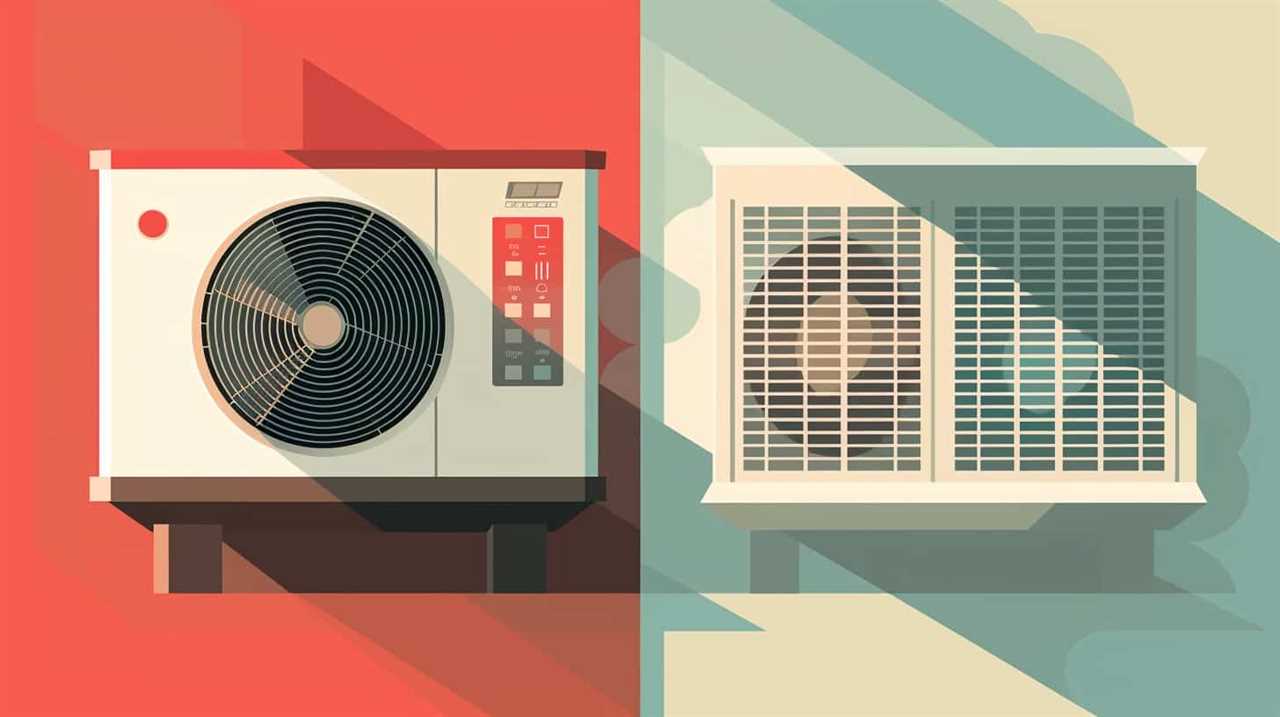
-
Proper temperature control: A well-calibrated thermostat ensures that your HVAC system accurately maintains the desired temperature in your home.
-
Energy efficiency: A malfunctioning thermostat can result in wasted energy and higher utility bills.
-
System protection: Regular maintenance helps identify and address any issues with the thermostat, preventing potential damage to the HVAC system.
-
Comfort optimization: A properly functioning thermostat provides consistent and comfortable indoor temperatures.

-
Troubleshooting: Testing and calibrating your thermostat can help identify and resolve common thermostat problems, such as inaccurate temperature readings or unresponsive controls.
Scheduling Professional Annual Maintenance
We should make sure to schedule professional annual maintenance for our air conditioning heat pump. Scheduling service with reliable technicians is essential to ensure the optimal performance and longevity of our equipment.
When it comes to finding reliable technicians, we should look for companies that have a good reputation and positive customer reviews. It’s also important to check if they’re licensed and insured, as this guarantees their expertise and protects us from any potential liabilities. Additionally, we should inquire about their experience and training to ensure they’re knowledgeable about our specific air conditioning heat pump model.
Frequently Asked Questions
How Often Should I Clean or Replace My Air Filters?
We should clean or replace our air filters regularly to ensure optimal performance. By choosing the right filter and following tips for extending its lifespan, we can maintain clean air and prolong the life of our air conditioning heat pump.
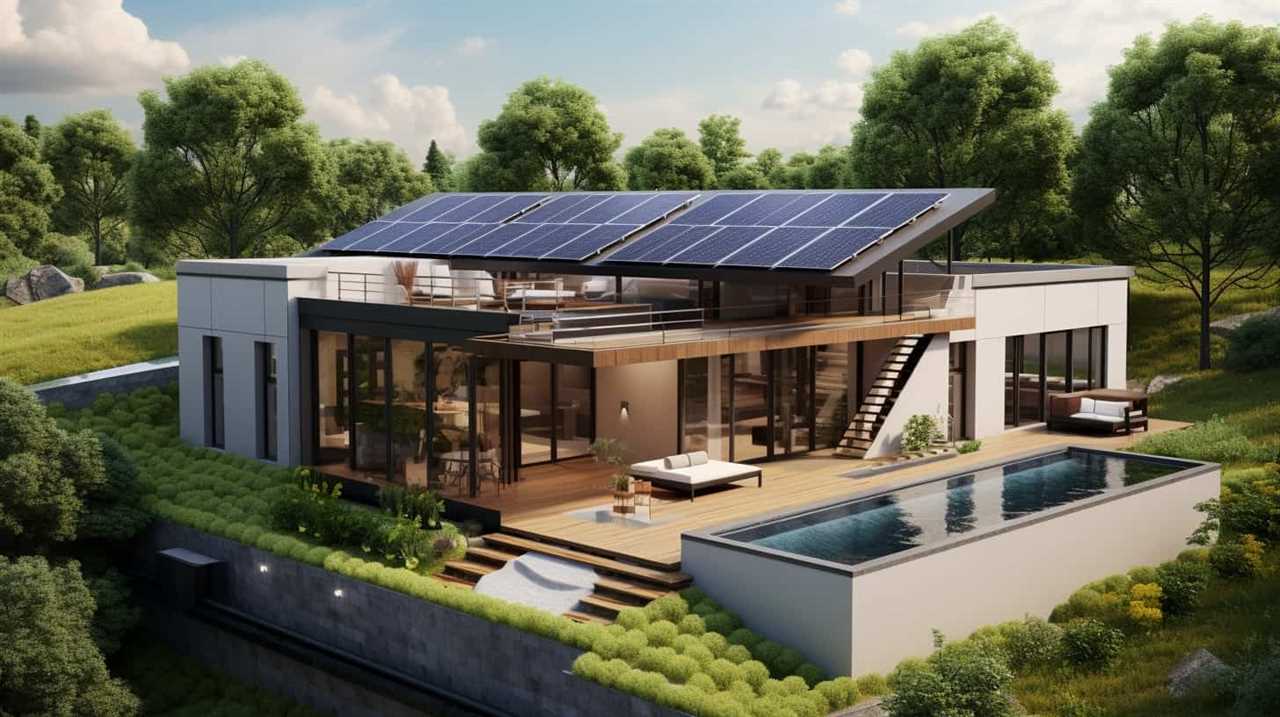
Can I Clean the Outdoor Unit by Myself, or Do I Need to Hire a Professional?
We can clean the outdoor unit ourselves, but hiring a professional has its benefits. DIY outdoor unit cleaning saves money, but professionals have expertise and can ensure thorough cleaning, preventing damage and optimizing performance.
Are There Any Specific Cleaning Agents or Techniques That I Should Use to Clean the Indoor Coils?
When cleaning indoor coils, it’s crucial to use the right cleaning agents and techniques. For example, we recommend using a coil cleaner specifically designed for HVAC systems and a soft brush for gentle scrubbing.
How Often Should I Lubricate the Moving Parts of My Air Conditioning Heat Pump?
We should inspect the refrigerant levels of our air conditioning heat pump regularly to ensure optimal performance. Signs of a malfunctioning heat pump include insufficient cooling or heating, strange noises, and frequent cycling.
Is It Necessary to Calibrate the Thermostat, and if So, How Often Should I Do It?
Calibrating the thermostat is essential for optimal performance. Regular calibration ensures accurate temperature control, like a compass guiding a ship. It maximizes energy efficiency, comfort, and system longevity. We recommend calibrating annually.
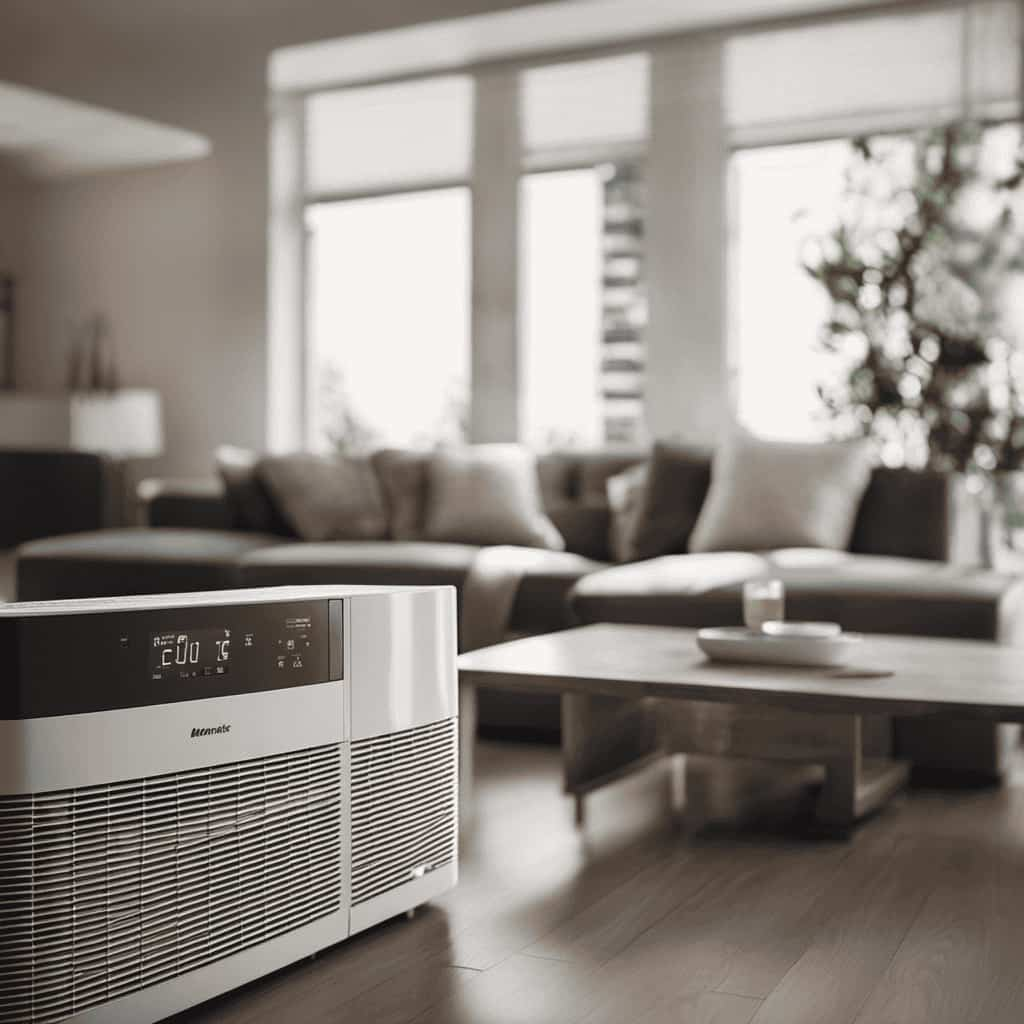
Conclusion
In the ever-changing landscape of maintenance, ensuring the optimal performance of your air conditioning heat pump is crucial.
By following this quick 30-minute guide, you can keep your system running smoothly and efficiently.
Remember, just as we maintain our bodies, our machines need care too.
So, take charge and be the guardian of your cooling system’s well-being.
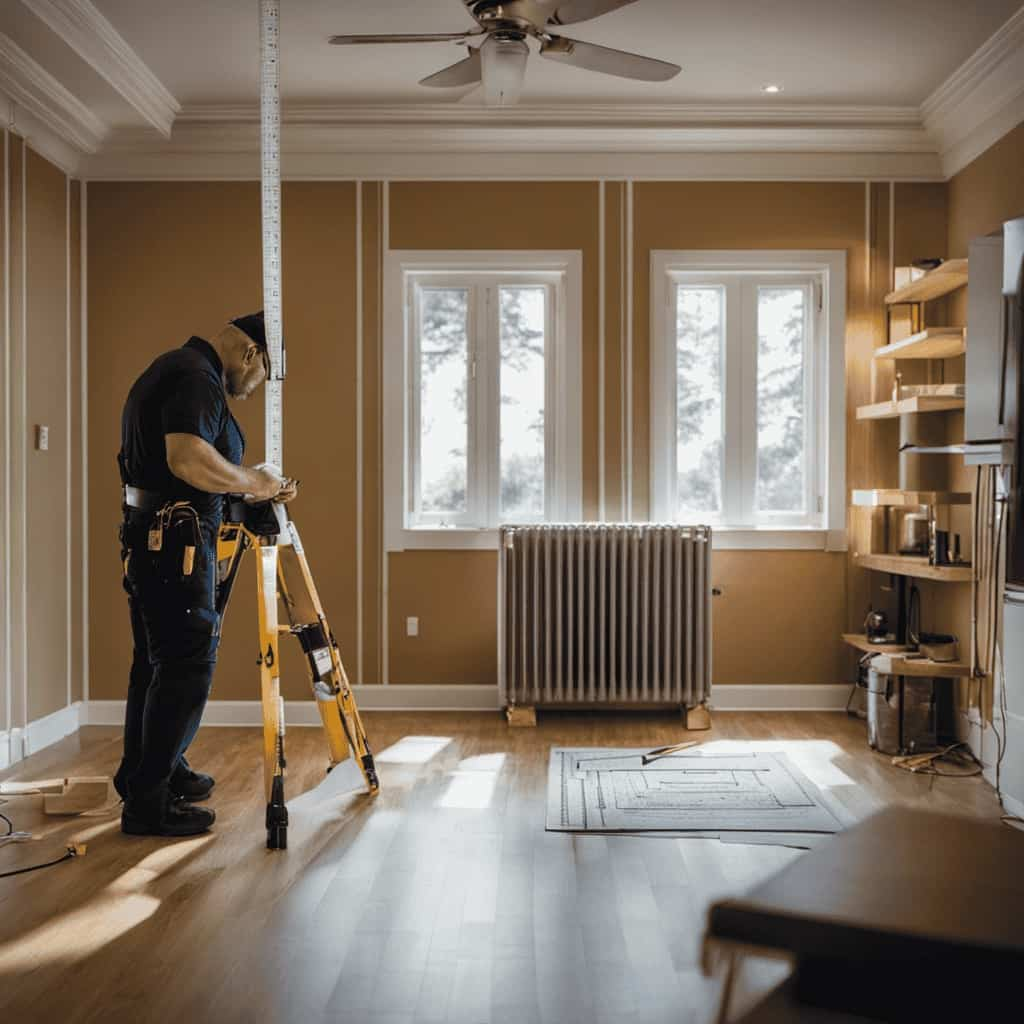
Let your maintenance rituals symbolize the commitment you have towards a cool and comfortable environment.
Air Conditioning
Chill Out: Unraveling Air Conditioning Heat Pump Prices

Everyone wants to stay cool during the scorching summer months, but did you know that the prices of air conditioning units can vary significantly? In fact, the costs of installation, maintenance, and repairs can add up quickly.
That’s why we’re here to help unravel the complexities and provide you with the information you need to make the best decisions for your home.
From understanding the factors that affect prices to finding affordable installation services, we’ve got you covered.
So, let’s dive in and chill out!

Key Takeaways
- Factors affecting air conditioning heat pump prices include the size and capacity of the unit, energy efficiency rating, complexity of installation, brand reputation, and manufacturer warranty.
- The cost of air conditioning heat pump installation depends on the size and complexity of the system, quality of the equipment, labor involved, and long-term benefits such as increased energy efficiency and improved comfort.
- When comparing air conditioning heat pump brands and prices, factors to consider include energy efficiency, reliability, warranty coverage, price comparison, and finding a balance between upfront cost and long-term savings.
- Hidden costs to consider when installing an air conditioning heat pump include hidden installation fees, long-term energy savings, obtaining a detailed quote from the installer, weighing hidden costs against long-term benefits, and making an informed decision.
Factors Affecting Air Conditioning Heat Pump Prices
When considering air conditioning heat pump prices, there are several factors that can affect the overall cost. Understanding these factors is crucial for finding affordable air conditioning heat pump installation services.
The size and capacity of the unit play a significant role in determining the price. Larger units with higher capacities tend to be more expensive.
Additionally, the energy efficiency rating of the heat pump impacts the cost. Units with higher efficiency ratings are typically pricier, but they can lead to long-term savings on energy bills.
The complexity of the installation process is another factor to consider. If the installation requires additional ductwork or modifications to the existing system, it can increase the overall cost.
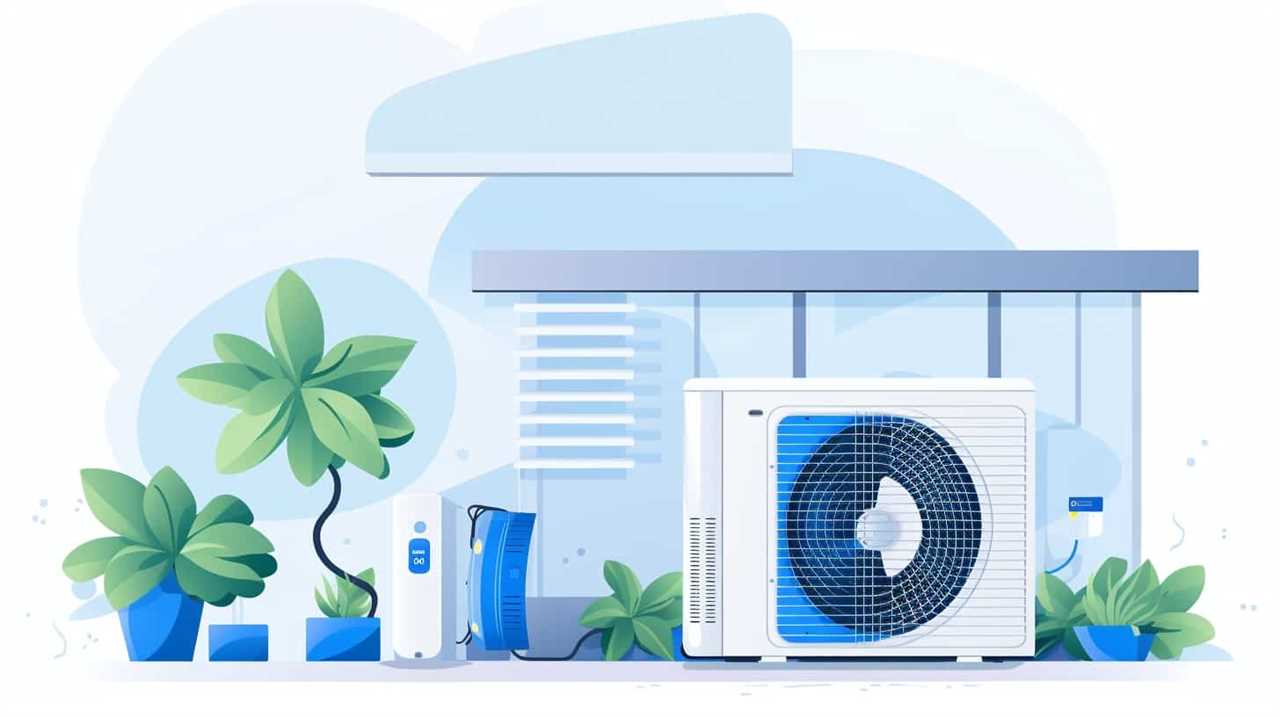
Lastly, the brand reputation and warranty offered by the manufacturer can influence the price.
Considering these factors and seeking out reputable and affordable installation services is essential for making an informed decision.
Understanding the Cost of Air Conditioning Heat Pump Installation
We have identified three key factors that contribute to the cost of air conditioning heat pump installation:
-
The size and complexity of the system: This is determined by the square footage of the area to be cooled and the number of rooms or zones that need to be controlled. A larger system or one with more advanced features will generally cost more.

-
The quality of the equipment: This also affects the price, as higher efficiency units tend to be more expensive upfront but can save on energy costs in the long run.
-
The labor involved: This includes any necessary modifications to the existing infrastructure and will contribute to the overall cost.
It’s important to consider the long-term benefits of air conditioning heat pump installation, such as increased energy efficiency and improved comfort, when evaluating the cost.
Comparing Air Conditioning Heat Pump Brands and Prices
As we compare air conditioning heat pump brands and prices, it’s important to consider factors such as energy efficiency, reliability, and warranty coverage. These factors can greatly impact the long-term cost and satisfaction of owning an air conditioning heat pump.

Here are four key considerations when comparing different brands and their prices:
-
Energy efficiency: Look for models that have a high SEER (Seasonal Energy Efficiency Ratio) rating. Higher SEER ratings indicate better energy efficiency and lower operating costs over time.
-
Reliability: Research customer reviews and ratings to determine the reliability of different brands. A reliable air conditioning heat pump will require fewer repairs and have a longer lifespan.
-
Warranty coverage: Check the warranty options offered by each brand. A comprehensive warranty can provide peace of mind and protect against unexpected repair costs.

-
Price: Compare the prices of different brands, taking into account the energy efficiency and warranty coverage. It’s important to find a balance between upfront cost and long-term savings.
Hidden Costs to Consider When Installing an Air Conditioning Heat Pump
Before making a decision, it’s important for us to be aware of the hidden costs associated with installing an air conditioning heat pump.
While the upfront price of the heat pump itself is a significant consideration, there are other expenses to keep in mind. One of these is the hidden installation fees. These fees can vary depending on factors such as the complexity of the installation, the location of the unit, and any additional work that may be required. It’s crucial to obtain a detailed quote from the installer to understand the full cost of the installation.
Another factor to consider is the long-term energy savings that can be achieved with an air conditioning heat pump. While the initial investment may be higher, the efficiency of the heat pump can lead to substantial savings on energy bills over time.

It’s essential to weigh these hidden costs against the potential long-term benefits before making a decision.
How to Budget for Air Conditioning Heat Pump Installation
When it comes to budgeting for air conditioning heat pump installation, there are a few cost-saving installation tips that can help keep expenses down.
One option is to consider financing options available, such as low-interest loans or payment plans, which can make the upfront costs more manageable.
Cost-Saving Installation Tips
We should consider three cost-saving installation tips to help us budget for air conditioning heat pump installation.

-
Choose cost-effective options: When selecting an air conditioning heat pump, consider the initial cost, as well as long-term savings. Look for models that offer energy efficiency and lower maintenance costs. Additionally, consider purchasing from reputable manufacturers that offer warranties and after-sales support.
-
Optimize installation location: Proper placement of the heat pump can significantly impact its efficiency and overall performance. Ensure that the unit is installed in a shaded area to reduce the load on the system and prevent unnecessary strain. Additionally, avoid areas with high humidity or excessive dust accumulation, as this can affect the heat pump’s longevity.
-
Seek professional installation services: Hiring a professional for installation ensures that the process is done correctly, minimizing the risk of errors or damage. They can also provide expert advice on optimizing the system’s performance and efficiency.
Financing Options Available
Let’s explore the financing options available to help us budget for air conditioning heat pump installation.
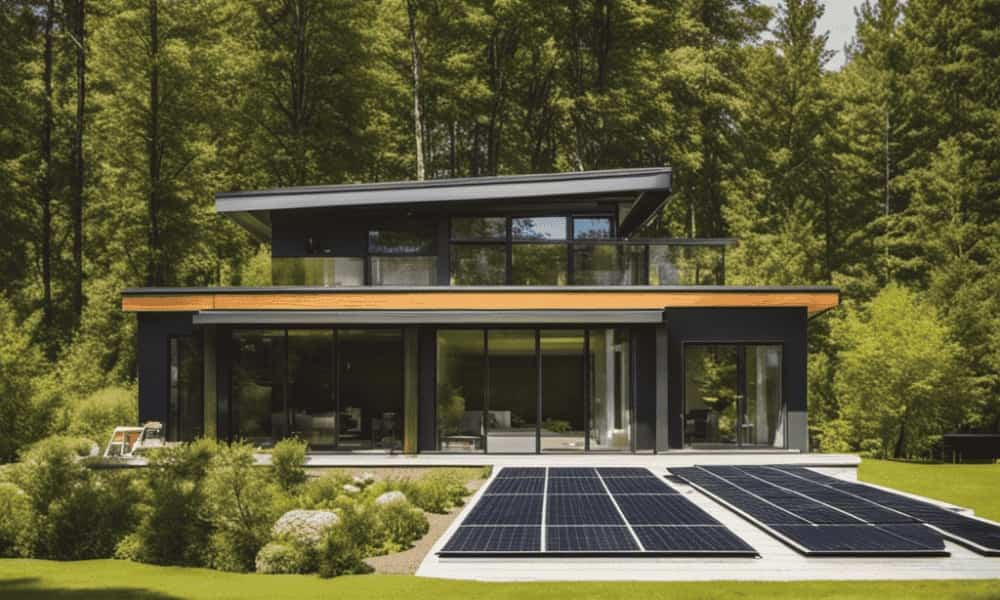
When it comes to paying for the installation of an air conditioning heat pump, there are several payment options to consider. Many HVAC companies offer financing programs that allow customers to spread the cost of the installation over a period of time. These programs often come with competitive interest rates, making it more affordable for homeowners to invest in a new system. Some financing options may even offer promotional periods with low or zero interest rates, providing additional savings.
By utilizing these payment options, homeowners can better manage their budgets and avoid the upfront costs of installation.
Now that we understand the financing options available, let’s move on to the next section where we’ll discuss tips for finding affordable air conditioning heat pump installation services.
Tips for Finding Affordable Air Conditioning Heat Pump Installation Services
Finding affordable air conditioning heat pump installation services can be a challenge. When searching for the best installation services at a reasonable price, consider the following tips:

-
Compare quotes from multiple service providers: Request quotes from different installation companies to compare prices and services offered. This will help you find the most affordable option that meets your requirements.
-
Seek recommendations: Ask friends, family, or neighbors who’ve recently installed air conditioning heat pumps for recommendations on affordable and reliable installation services.
-
Look for special offers or discounts: Keep an eye out for special promotions or discounts offered by installation companies. These can provide an opportunity to save money on the installation cost.
-
Consider DIY installation: If you have the necessary skills and knowledge, opting for a DIY installation can save you a significant amount of money. However, ensure that you’re confident in your abilities before attempting this option.

Financing Options for Air Conditioning Heat Pump Installation
When it comes to financing options for air conditioning heat pump installation, there are two main choices to consider: obtaining a loan or leasing the equipment. Both options have their pros and cons, and it’s important to carefully evaluate them based on your specific circumstances.
Additionally, credit requirements may vary depending on the financing option you choose, so it’s crucial to check your credit score and history beforehand.
Lastly, it’s worth exploring the payment plans offered by different lenders or leasing companies to find one that aligns with your budget and preferences.
Loan Vs. Lease
We’ve compared the pros and cons of loan and lease options to finance the installation of an air conditioning heat pump. Here’s a breakdown of each option:
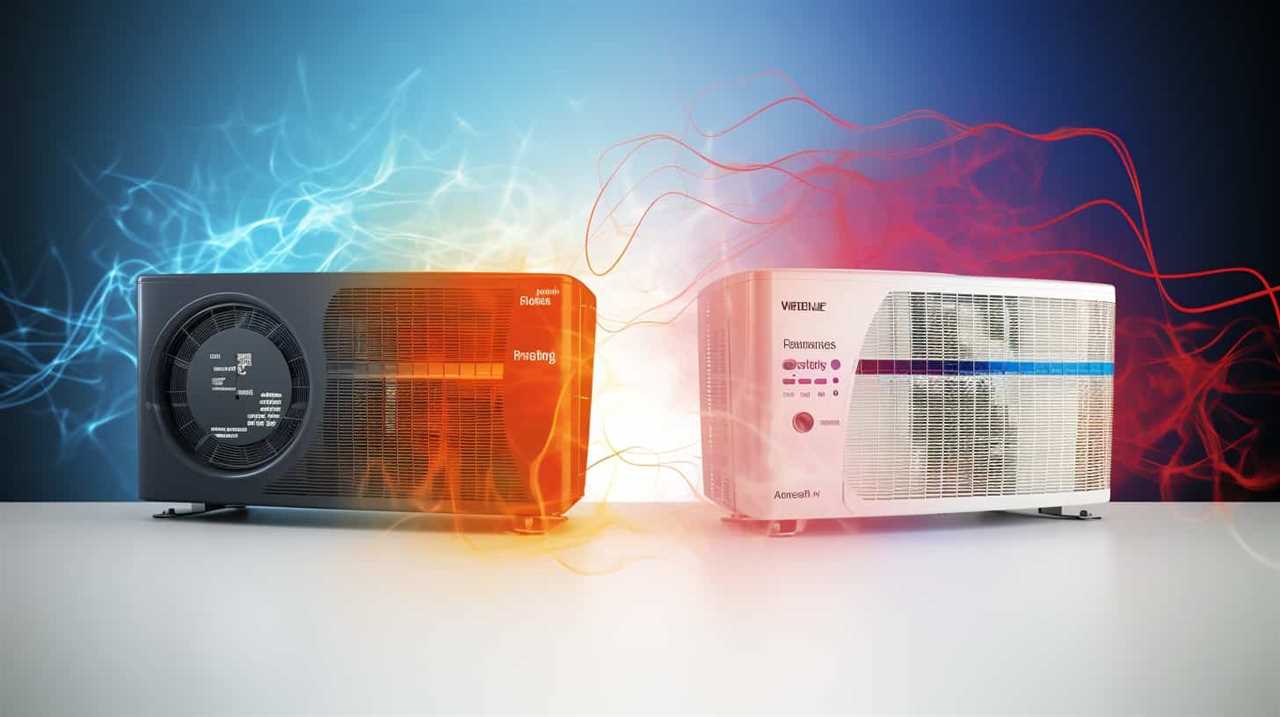
-
Loan options: Taking out a loan allows you to own the heat pump outright. With a loan, you make monthly payments towards the principal and interest. This option gives you the flexibility to choose the loan term and interest rate that best fits your budget.
-
Lease agreements: Leasing a heat pump means you don’t own it, but you have the right to use it for a specified period. Lease agreements typically come with lower upfront costs and maintenance responsibilities. However, you won’t build equity in the equipment and may have restrictions on customization.
-
Flexibility: Loans offer more flexibility in terms of equipment choices and customization options. With a lease, you may have limited options for equipment selection and modifications.
-
Long-term costs: While loans may have higher upfront costs, in the long run, you’ll own the equipment and benefit from reduced energy bills. Leases may have lower upfront costs, but you’ll have ongoing monthly payments and may not experience the same energy savings.

Considering the pros and cons of loan and lease options, it’s important to evaluate your financial situation and long-term goals before making a decision.
Now, let’s dive into the credit requirements for financing an air conditioning heat pump installation.
Credit Requirements
To finance the installation of an air conditioning heat pump, our credit requirements and available financing options must be considered. When it comes to credit requirements, lenders typically evaluate factors such as credit score, income, and debt-to-income ratio. A good credit score and stable income will increase your chances of securing favorable financing options for your air conditioning heat pump installation. Speaking of financing options, let’s take a look at the table below to understand the different options available:
| Financing Option | Description | Pros |
|---|---|---|
| Personal Loan | A loan obtained from a bank or credit union for the specific purpose of financing your air conditioning heat pump installation. | Flexible repayment terms, lower interest rates compared to credit cards. |
| Manufacturer Financing | Financing options offered by the manufacturer of the air conditioning heat pump. | Special promotions or discounts, may have more lenient credit requirements. |
| Home Equity Loan | A loan that allows you to borrow against the equity in your home. | Potentially tax-deductible interest, longer repayment terms. |
Payment Plans Offered
By exploring the available financing options, we can find payment plans that suit our budget for air conditioning heat pump installation. Here are four financing options to consider:

-
Traditional Bank Loan: This option allows us to borrow a specific amount of money from a bank to finance our air conditioning heat pump installation. We’ll need to repay the loan over a fixed period of time with interest.
-
Manufacturer Financing: Some air conditioning heat pump manufacturers offer financing options directly to customers. These financing plans may come with competitive interest rates and flexible repayment terms.
-
Lease-to-Own: With a lease-to-own option, we can lease the air conditioning heat pump and have the option to purchase it at the end of the lease term. This option may be beneficial for those who prefer lower monthly payments initially.
-
Home Equity Line of Credit (HELOC): If we’ve equity in our home, we can use a HELOC to finance our air conditioning heat pump installation. This option allows us to borrow against the equity in our home and typically offers lower interest rates than other financing options.

Saving Money on Air Conditioning Heat Pump Maintenance and Repairs
Our best strategy for saving money on air conditioning heat pump maintenance and repairs is to perform regular inspections and cleanings. By conducting routine inspections, we can identify any potential issues early on and address them before they become major problems. This can help prevent costly repairs down the line.
Additionally, regular cleanings of the air conditioning heat pump can improve its efficiency and prolong its lifespan. Cleaning the coils, filters, and condensate drain can ensure that the heat pump operates at its optimal level, reducing energy consumption and saving money on utility bills.
It’s also important to check and tighten any loose electrical connections, as they can lead to performance issues or even system failure. Following these maintenance tips can help homeowners save money and keep their air conditioning heat pumps running smoothly.
Frequently Asked Questions
Are There Any Government Incentives or Tax Credits Available for Purchasing and Installing an Air Conditioning Heat Pump?
Yes, there are government incentives and tax credits available for purchasing and installing an air conditioning heat pump. These include government tax incentives and energy efficiency rebates that can help offset the cost of the system.
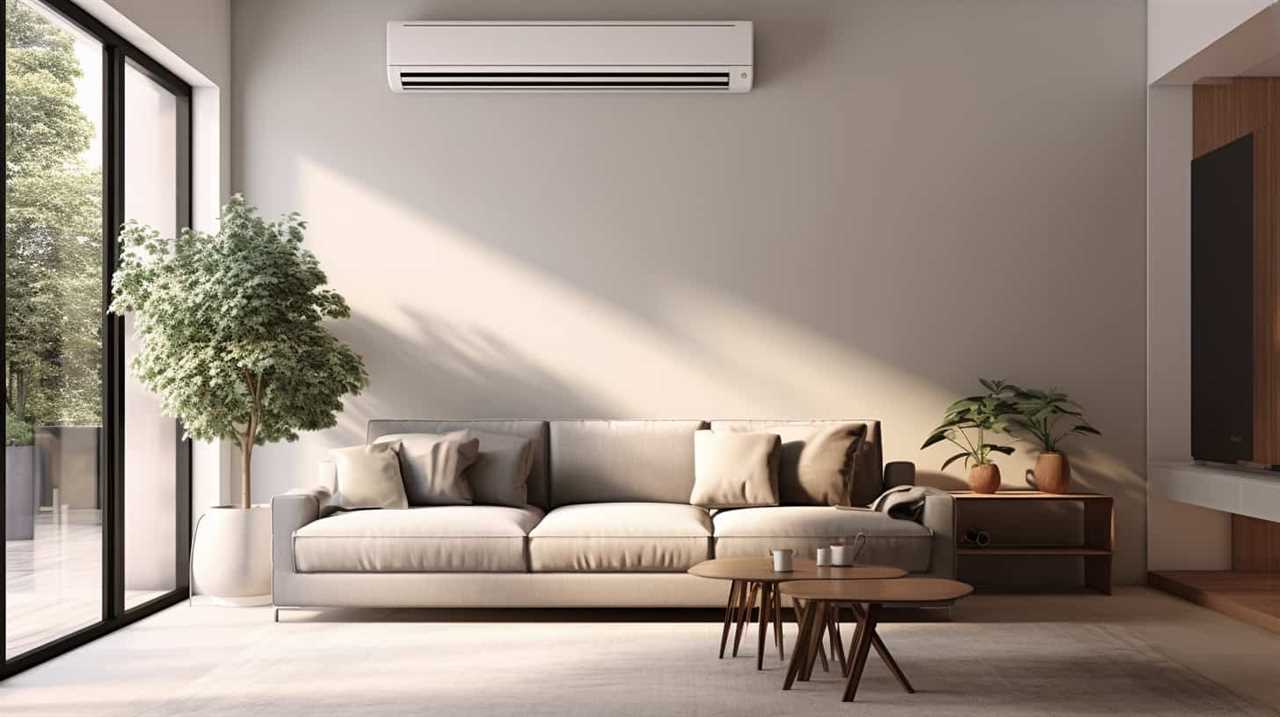
What Is the Average Lifespan of an Air Conditioning Heat Pump?
The average lifespan of an air conditioning heat pump can vary, but it is typically around 15-20 years. Regular maintenance, such as cleaning the filters and coils, can help prolong its lifespan.
Can I Install an Air Conditioning Heat Pump Myself, or Is Professional Installation Required?
We can choose to install an air conditioning heat pump ourselves, but professional installation is recommended. DIY installation may save money, but professional installation ensures proper setup and performance, minimizing potential risks and maximizing efficiency.
How Can I Determine the Right Size Air Conditioning Heat Pump for My Home?
To determine the right size air conditioning heat pump for our home, we need to consider factors such as square footage, insulation, and climate. Proper sizing ensures optimal performance and energy efficiency, resulting in lower maintenance costs and greater comfort.
Are There Any Energy-Saving Features or Technologies That I Should Look for When Choosing an Air Conditioning Heat Pump?
When choosing an air conditioning heat pump, it’s important to consider energy-efficient technologies and the benefits of smart thermostats. These features can help reduce energy consumption and lower utility bills.

Conclusion
In conclusion, if you want to unravel the mysterious world of air conditioning heat pump prices, just take a chill pill.
While the cost of installation and maintenance may cause some sweat to form on your brow, there are ways to keep your cool.
By understanding the factors that affect prices, comparing brands, and considering hidden costs, you can budget wisely and find affordable installation services.
So don’t let the heat get to you, stay cool and save some cash!
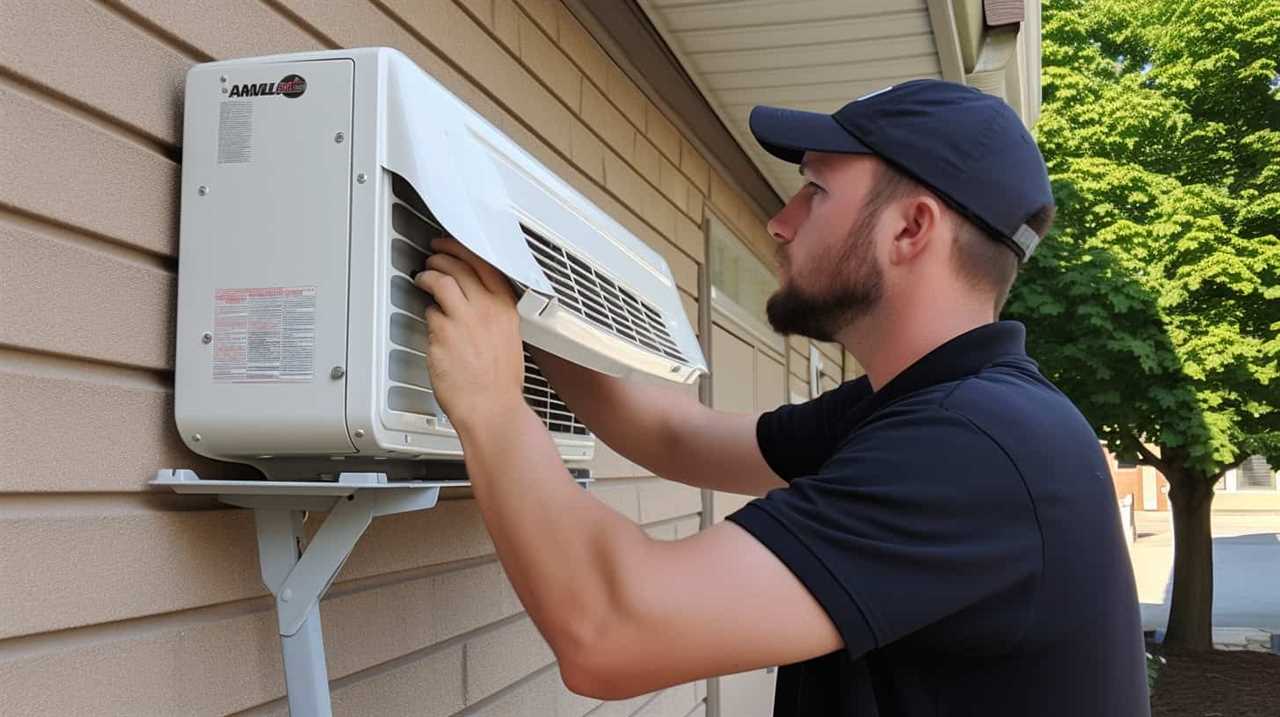
Air Conditioning
What Are the Top Energy-Efficient Heat Pump Acs

We have found the top energy-efficient heat pump air conditioners that are revolutionizing the way we cool our homes.
Did you know that these advanced units can reduce energy consumption by up to 50% compared to traditional air conditioners?
In this article, we’ll explore the top brands in the market and share essential factors to consider when choosing an energy-efficient heat pump AC.
Get ready to embrace innovation and maximize your cooling efficiency with these cutting-edge systems.
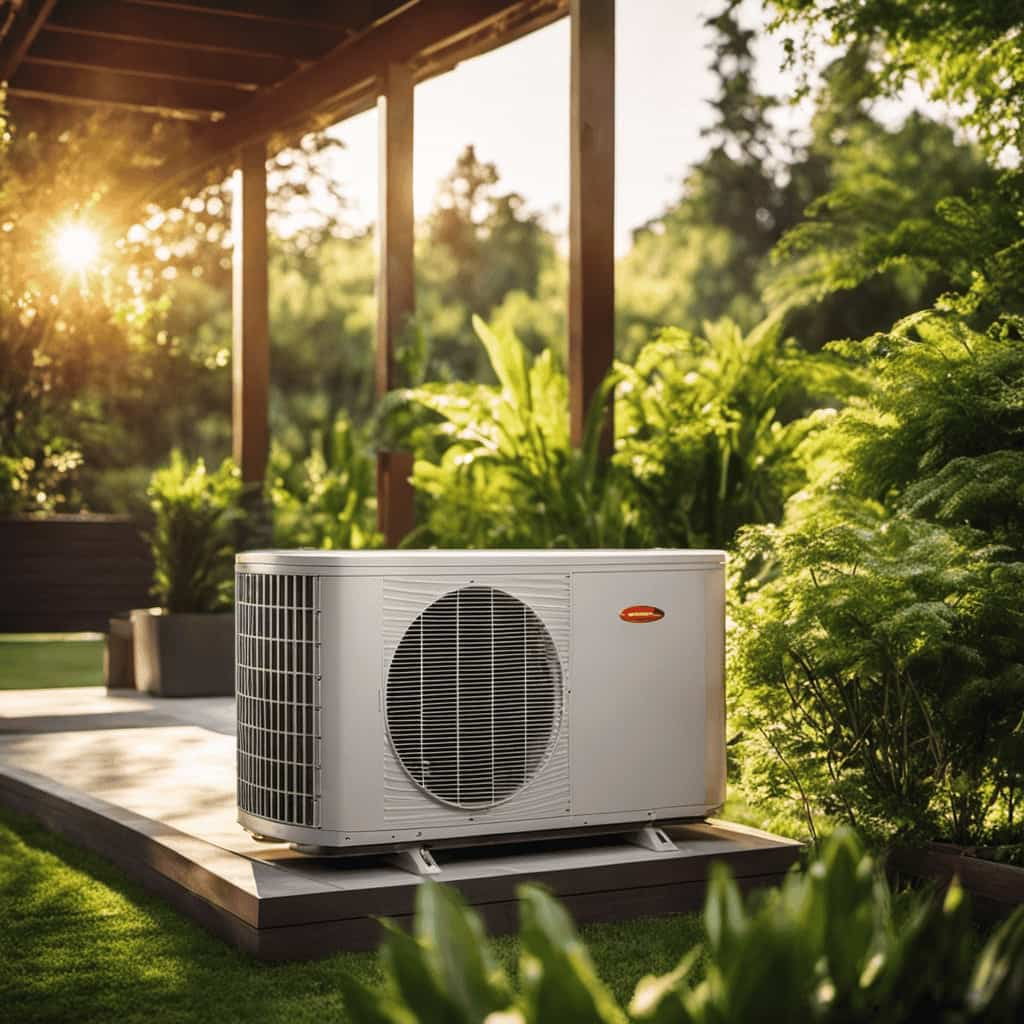
Key Takeaways
- Energy-Efficient Heat Pump ACs can reduce energy consumption by up to 50% compared to traditional air conditioners, leading to significant savings on electricity bills.
- The SEER rating of a heat pump AC is an important factor to consider, as higher SEER ratings indicate greater energy efficiency.
- It is crucial to choose the right size heat pump AC for optimal energy efficiency, avoiding units that are either too small or oversized.
- Trane and Carrier are top brands in the market that offer reliable and sustainable cooling and heating solutions, prioritizing innovation and efficiency.
Benefits of Energy-Efficient Heat Pump ACs
We love energy-efficient heat pump ACs because they save us money on our electricity bills. These advanced systems utilize cutting-edge energy-saving technology, allowing us to reduce our energy consumption without sacrificing comfort.
By using less electricity, we can significantly lower our monthly utility costs, resulting in substantial long-term cost savings. Energy-efficient heat pump ACs are designed to operate at optimal efficiency levels, maximizing the cooling and heating output while minimizing energy waste.
This innovative technology not only benefits our wallets but also helps protect the environment by reducing our carbon footprint.
When considering the purchase of an energy-efficient heat pump AC, it’s crucial to evaluate factors such as energy efficiency ratings, capacity, and compatibility with our home’s existing HVAC system. Making an informed decision ensures that we can fully enjoy the benefits of energy-efficient cooling and heating while maximizing our cost savings.
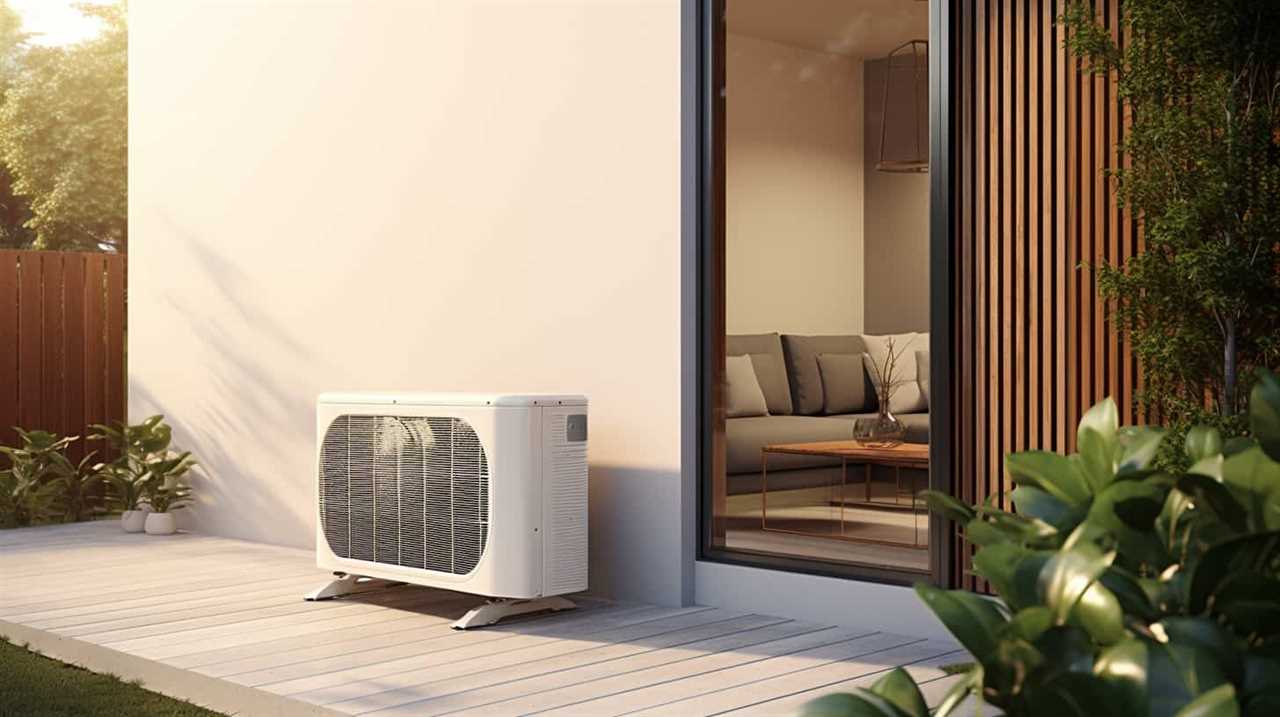
Factors to Consider When Choosing an Energy-Efficient Heat Pump AC
Two key factors to consider when choosing an energy-efficient heat pump AC are the SEER rating and the size of the unit.
-
SEER rating: The Seasonal Energy Efficiency Ratio (SEER) measures the cooling efficiency of an AC unit. Higher SEER ratings indicate greater energy efficiency, resulting in lower energy consumption and cost savings over time. Look for units with SEER ratings of 14 or higher for optimal energy efficiency.
-
Size of the unit: Choosing the right size is crucial for energy efficiency. A unit that’s too small will struggle to cool the space efficiently, while an oversized unit will cycle on and off frequently, wasting energy. It’s important to have a professional assess the cooling needs of your space and recommend the appropriate size.
Considering these factors won’t only ensure cost-effective options for energy-efficient heat pump ACs but also minimize the environmental impact of your cooling system.

Top Energy-Efficient Heat Pump AC Brands in the Market
Among the top energy-efficient heat pump AC brands in the market, Trane and Carrier stand out for their innovative technology and high-performance units. These brands offer a range of top rated heat pump AC models that provide both efficient cooling and heating, making them a cost effective heat pump AC option for consumers. Trane is known for its advanced ComfortLink™ II communicating technology, which allows the system components to automatically communicate and optimize performance. Carrier, on the other hand, offers the Infinity® Series heat pumps that deliver precise temperature control and enhanced energy efficiency. Both brands prioritize innovation and efficiency to provide customers with reliable and sustainable cooling and heating solutions.
| Brand | Technology | Energy Efficiency |
|---|---|---|
| Trane | ComfortLink™ II | High |
| Carrier | Infinity® Series | High |
Table 1: Comparison of Energy-Efficient Heat Pump AC Brands
These top energy-efficient heat pump AC brands offer cutting-edge technology and high energy efficiency ratings, making them a smart choice for consumers seeking innovative cooling and heating solutions.
Features to Look for in an Energy-Efficient Heat Pump AC
Our focus now shifts to the features to look for in an energy-efficient heat pump AC. When searching for the perfect unit, keep these key features in mind:
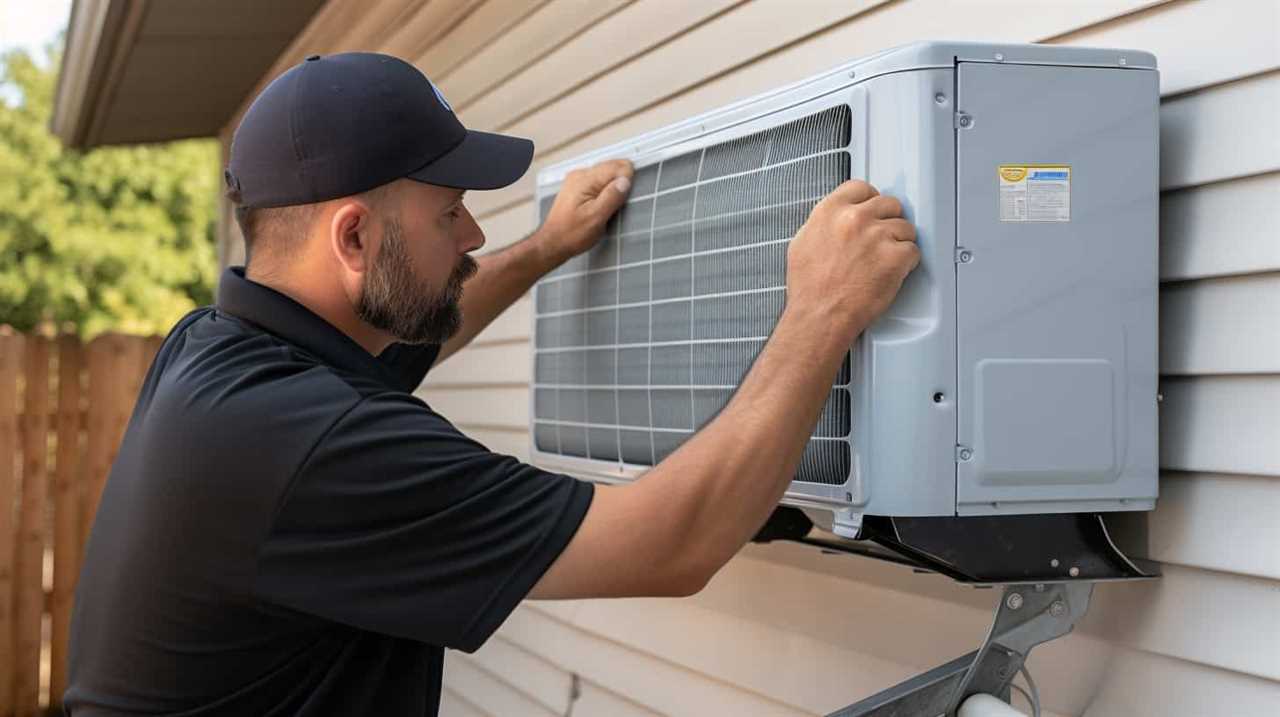
-
Energy-saving technology: Look for heat pump ACs that utilize advanced energy-saving technology. This can include features like variable speed compressors, which adjust the cooling output to match the specific needs of your home, resulting in reduced energy consumption.
-
Cost-effective cooling: Opt for a heat pump AC that offers cost-effective cooling. Look for units with high energy efficiency ratios (EER) and seasonal energy efficiency ratios (SEER), as these indicate how efficiently the unit can cool your space while minimizing energy usage and costs.
-
Smart thermostat compatibility: Consider heat pump ACs that are compatible with smart thermostats. This allows you to easily control and monitor your cooling system remotely, optimizing energy usage and comfort levels.
-
Zoning capabilities: Look for units that offer zoning capabilities, allowing you to independently control the temperature in different areas of your home. This feature ensures that you only cool the areas that need it, saving energy and reducing costs.

Tips for Maximizing Energy Efficiency With Heat Pump ACs
To maximize energy efficiency with heat pump ACs, we can follow these tips.
-
Utilize energy-saving techniques such as setting the thermostat to a moderate temperature and using the ‘energy saver’ mode. This reduces the workload on the heat pump and saves energy.
-
Ensure proper maintenance of the heat pump AC. Regularly clean or replace the air filters to improve airflow and system efficiency. Keep the outdoor unit clear of debris and vegetation to optimize heat exchange.
-
Additionally, schedule professional maintenance at least once a year to check for refrigerant leaks, inspect electrical connections, and calibrate the system.
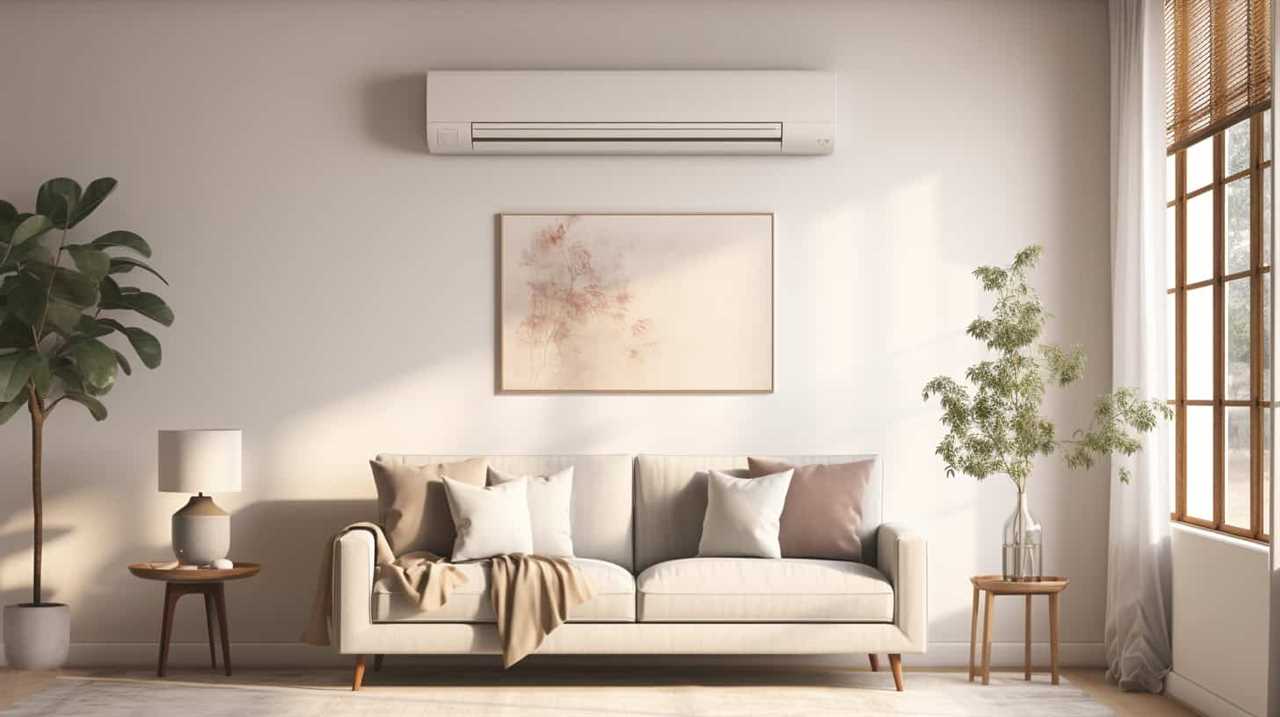
Frequently Asked Questions
How Much Money Can I Expect to Save on My Energy Bills by Using an Energy-Efficient Heat Pump Ac?
By using an energy-efficient heat pump AC instead of a traditional AC, we can expect to save a significant amount of money on our energy bills. The benefits of an energy-efficient heat pump AC include increased efficiency and reduced energy consumption.
Are There Any Tax Incentives or Rebates Available for Purchasing an Energy-Efficient Heat Pump Ac?
Yes, there are tax incentives and rebates available for purchasing an energy-efficient heat pump AC. These incentives can help offset the initial cost and encourage energy savings in the long run.
Can I Use an Energy-Efficient Heat Pump AC in Colder Climates?
Yes, you can use energy-efficient heat pump ACs in colder climates. They have the advantage of providing both cooling and heating, making them suitable for regions with varying temperatures.
How Long Does an Energy-Efficient Heat Pump AC Typically Last?
Heat pump ACs typically last for around 15-20 years. However, with proper maintenance, they can surpass this range. Regular maintenance can also help reduce the overall maintenance cost and ensure their longevity.
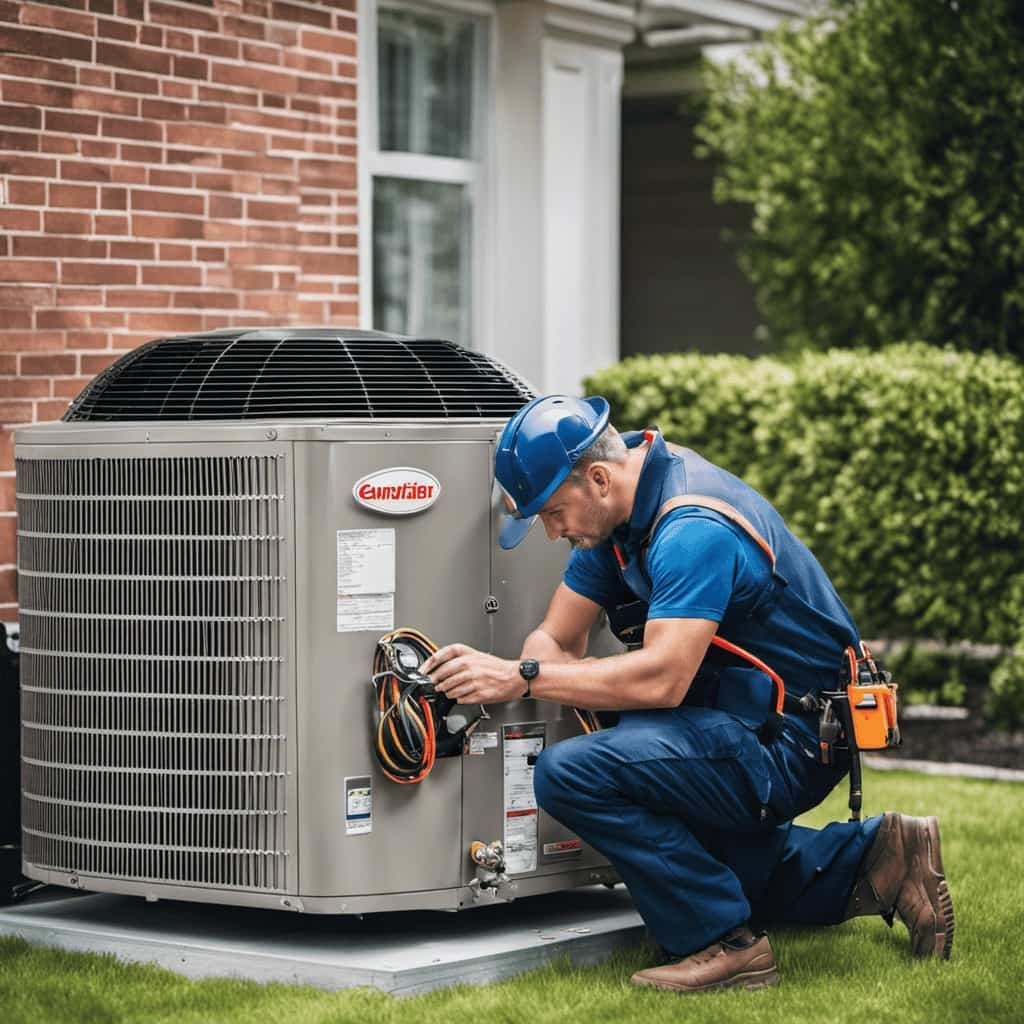
Are There Any Maintenance Requirements for Energy-Efficient Heat Pump Acs?
There are maintenance requirements for energy-efficient heat pump ACs. Regular filter cleaning, coil inspection, and refrigerant level checks are necessary to ensure optimal performance and maximize the benefits of these innovative systems.
Conclusion
In conclusion, choosing an energy-efficient heat pump AC can significantly reduce energy consumption and lower utility bills. By investing in top brands and considering important factors such as SEER ratings and size, consumers can make a smart choice.
Features like programmable thermostats and variable speed compressors further enhance the efficiency of these systems. By following tips for maximizing energy efficiency, individuals can create a comfortable and eco-friendly living space while saving money in the long run.
Air Conditioning
Your Guide: Installing a Heat Pump for AC

Are you looking for a way to beat the heat this summer and save on your energy costs? Interested in learning about installing a heat pump for air conditioning? Look no further, as we have the ultimate guide for you here.
Are you ready to revolutionize your cooling system? With our step-by-step process and expert tips, you’ll be well on your way to a more efficient and comfortable home.
Let’s dive in and discover the ins and outs of heat pump installation!
Key Takeaways
- Heat pumps transfer heat from one location to another and can provide both heating and cooling.
- Assessing the home’s cooling needs involves considering factors such as size, insulation, and climate, as well as evaluating the efficiency and maintenance requirements of heat pumps.
- Choosing the right heat pump size is important to ensure energy efficiency and minimize maintenance issues.
- Preparing the home for heat pump installation involves gathering necessary tools and materials, addressing insulation requirements, meeting electrical requirements, and preparing the outdoor area for installation.
Understanding Heat Pumps: A Brief Overview
Let’s start by understanding how heat pumps work and their key components. Heat pumps are innovative systems that use a small amount of energy to transfer heat from one location to another. They work by extracting heat from the air or ground outside your home and transferring it indoors during the colder months. In the summer, the process is reversed, and heat is extracted from the indoor air and released outside, providing cooling. This efficient mechanism allows heat pumps to provide both heating and cooling, making them versatile and cost-effective.
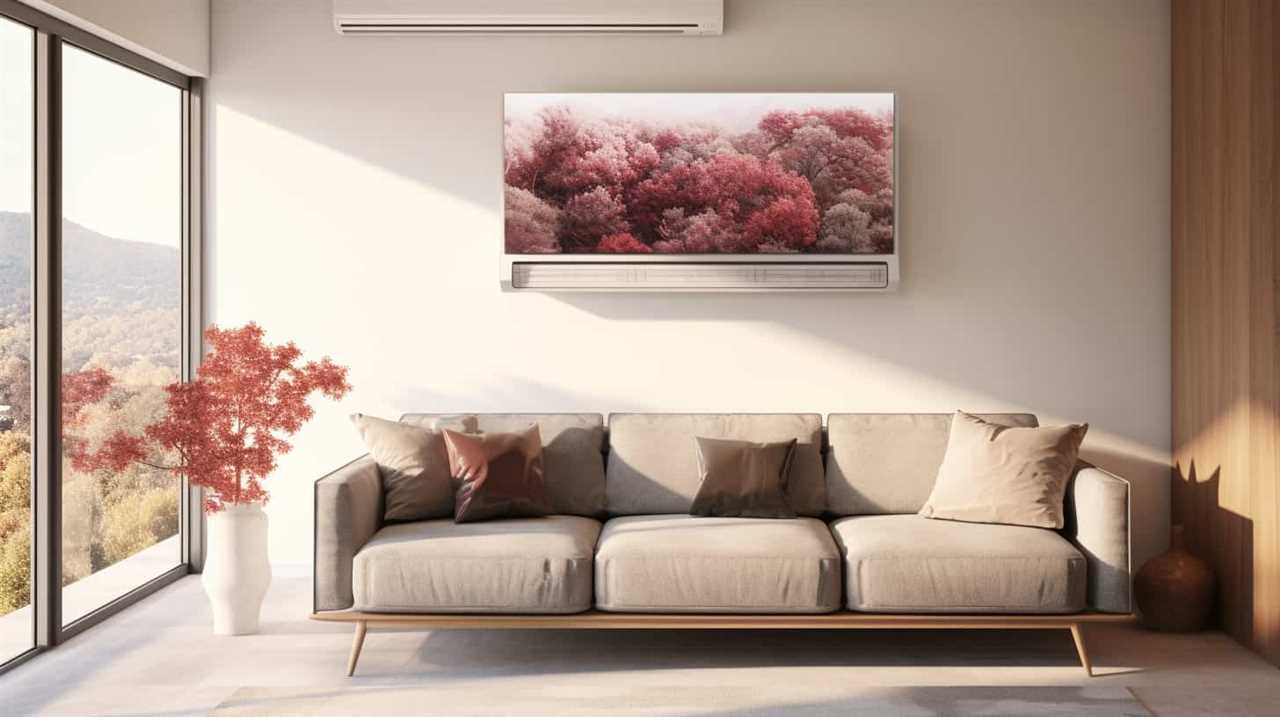
The benefits of heat pumps include energy efficiency, lower utility bills, and reduced environmental impact. Now that we’ve a basic understanding of heat pump mechanics and their advantages, let’s move on to assessing your home’s cooling needs.
Assessing Your Home’s Cooling Needs
To accurately determine our home’s cooling needs, we need to consider factors such as the size of our space, insulation levels, and the climate we live in.
Evaluating the efficiency of a heat pump is crucial in determining its ability to effectively cool our home. Heat pumps with higher Seasonal Energy Efficiency Ratios (SEER) are more efficient and can provide greater energy savings.
Additionally, we should also assess the maintenance requirements of the heat pump. Some models may require regular filter changes or annual professional maintenance to ensure optimal performance.
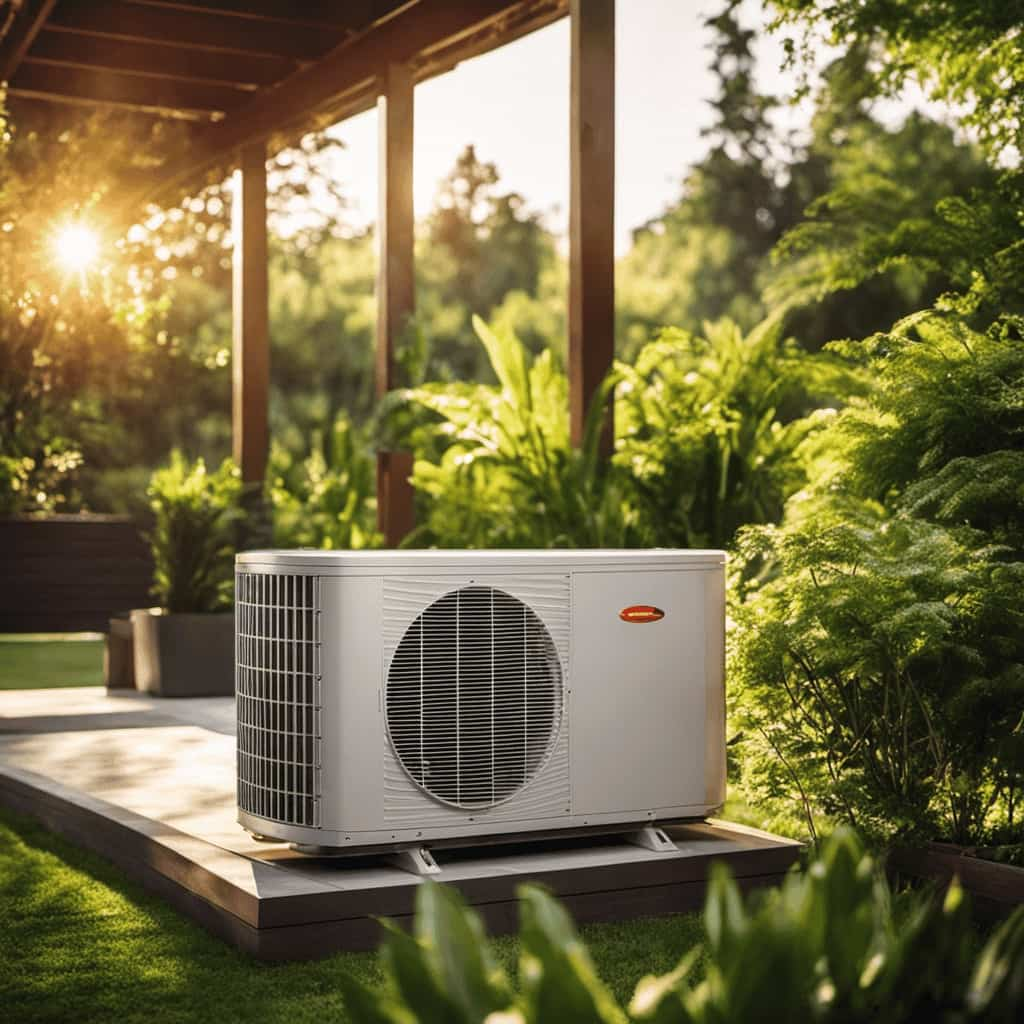
By evaluating these factors, we can choose a heat pump that meets our cooling needs while maximizing efficiency and minimizing maintenance requirements.
This will ensure a comfortable and cost-effective cooling solution for our home.
Choosing the Right Heat Pump Size
Determining the appropriate heat pump size involves calculating the square footage of our home and considering factors such as insulation, climate, and desired temperature. To ensure optimal heat pump efficiency, it’s crucial to choose a size that matches our specific cooling needs.
Oversized units can lead to frequent on-off cycling, causing unnecessary wear and tear on the system and reducing its lifespan. On the other hand, undersized units may struggle to cool the space efficiently, resulting in inadequate comfort and increased energy consumption.
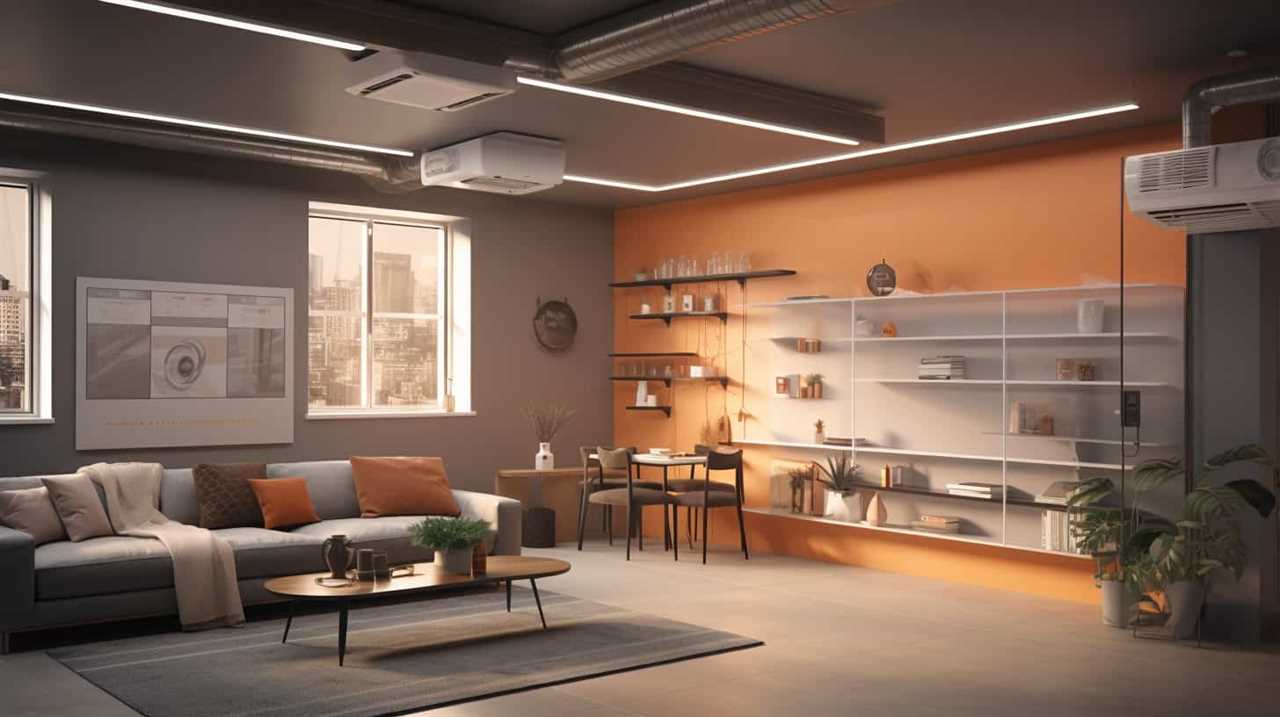
To find the right size, we can consult a professional HVAC technician who can perform a load calculation based on our home’s unique characteristics. This calculation takes into account factors like insulation levels, window efficiency, and local climate conditions. By selecting the correct heat pump size, we can maximize energy efficiency and minimize the need for future maintenance.
With the appropriate size determined, we can now move on to the next step of preparing our home for heat pump installation.
Preparing Your Home for Heat Pump Installation
We will need to gather all the necessary tools and materials before starting the heat pump installation process.
To ensure optimal performance and energy efficiency, it’s important to address insulation requirements in your home. Proper insulation will help prevent air leakage and maintain a comfortable indoor temperature. Inspect your attic, walls, and windows for any gaps or areas that may need additional insulation.
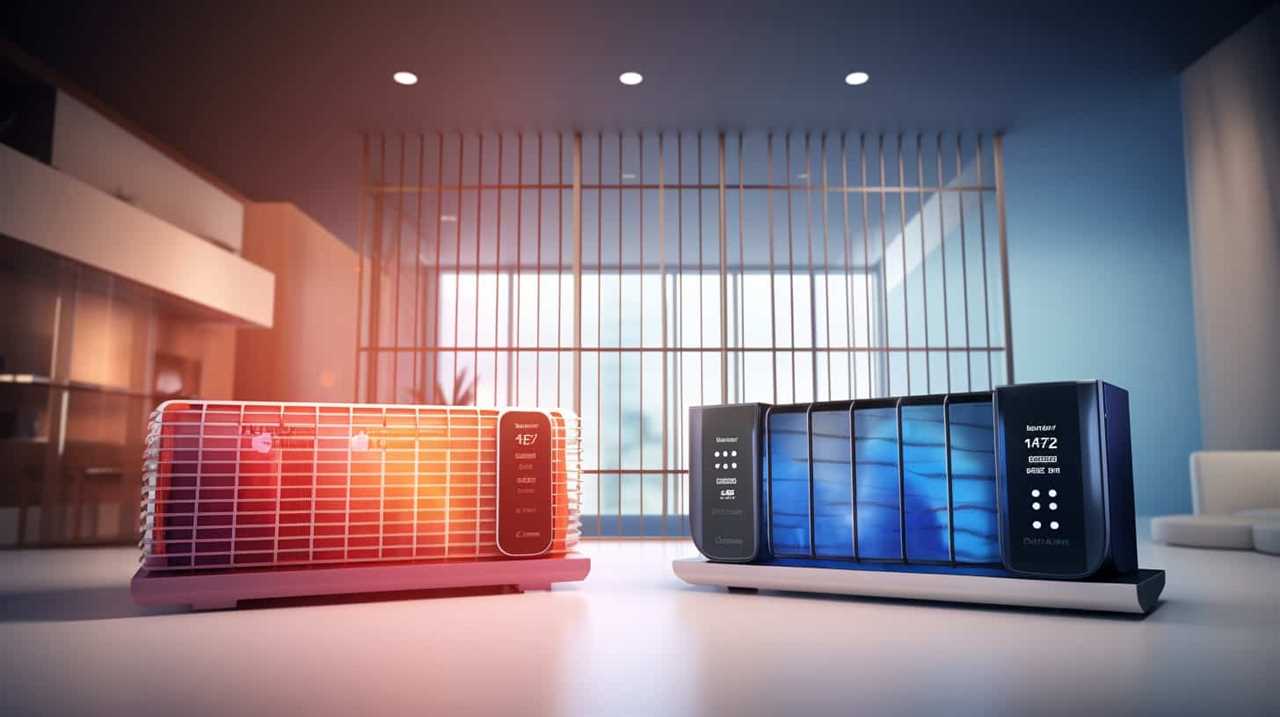
Additionally, it’s crucial to meet the electrical requirements for your heat pump installation. Consult with a licensed electrician to determine if your current electrical system can handle the load of the heat pump. If necessary, electrical upgrades may be needed to ensure safe and reliable operation.
Taking these steps will help prepare your home for a successful heat pump installation.
Step-by-Step Heat Pump Installation Process
First, we’ll begin by removing the old HVAC system and preparing the location for the new heat pump installation. This involves disconnecting the existing system, removing any ductwork, and ensuring the area is clean and ready for the new heat pump.
Once the area is prepared, we’ll begin the installation process. This includes mounting the heat pump unit outside, connecting the refrigerant lines, and installing the indoor unit. We’ll also need to connect the electrical wiring and thermostat.
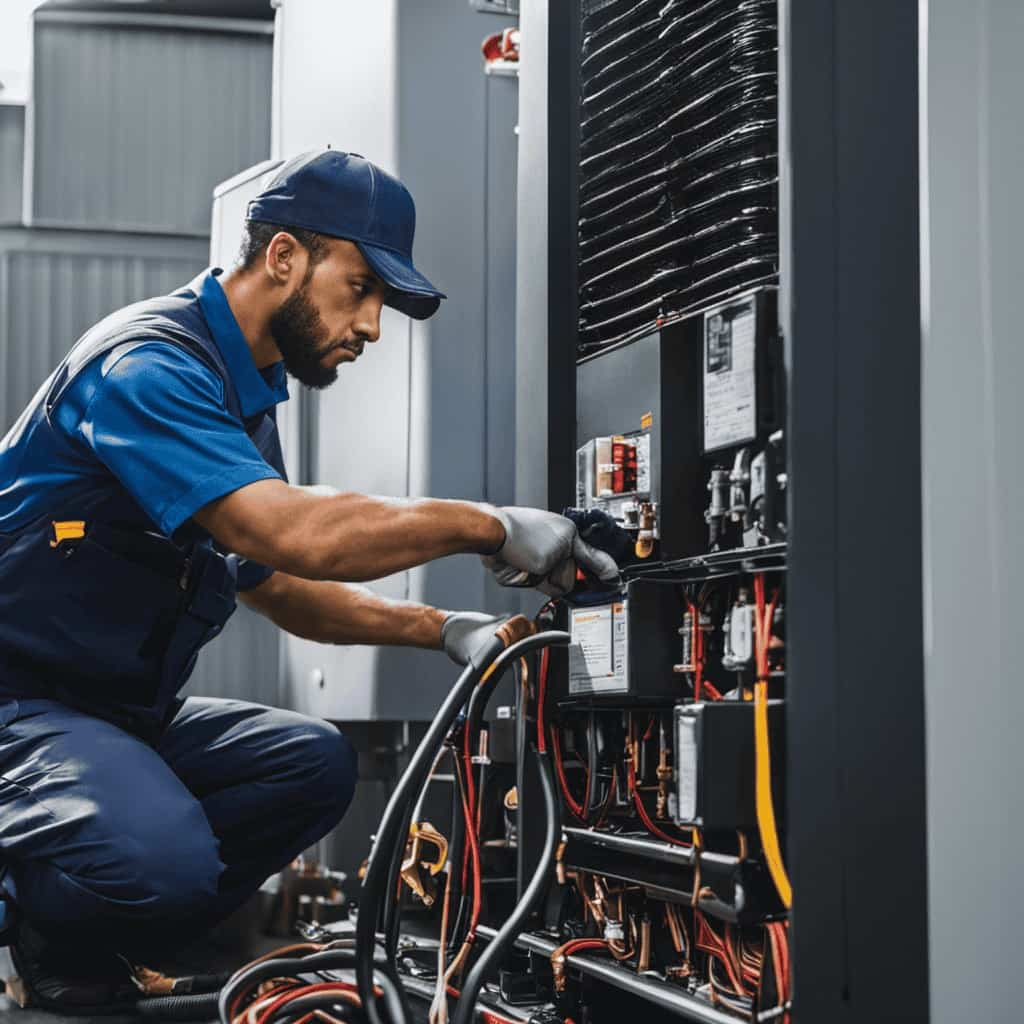
After the physical installation is complete, we’ll test the system to ensure it’s functioning properly. It’s important to note that regular heat pump maintenance is crucial for optimal performance. This includes cleaning or replacing filters, checking refrigerant levels, and troubleshooting any heat pump issues that may arise.
Frequently Asked Questions
What Is the Average Lifespan of a Heat Pump?
The average lifespan of a heat pump depends on various factors, such as maintenance requirements. It is important to regularly maintain your heat pump to ensure optimal performance and prolong its lifespan.
Are Heat Pumps Suitable for All Types of Homes?
Heat pumps are suitable for most homes due to their efficiency and cost savings. They can be installed in various types of homes, providing both heating and cooling capabilities.
How Often Should a Heat Pump Be Serviced?
Heat pump maintenance is crucial for optimal performance. Regular servicing ensures efficiency, prolongs lifespan, and minimizes breakdowns. Benefits include improved energy savings, enhanced comfort, and reduced environmental impact. Schedule annual maintenance to maximize the benefits.
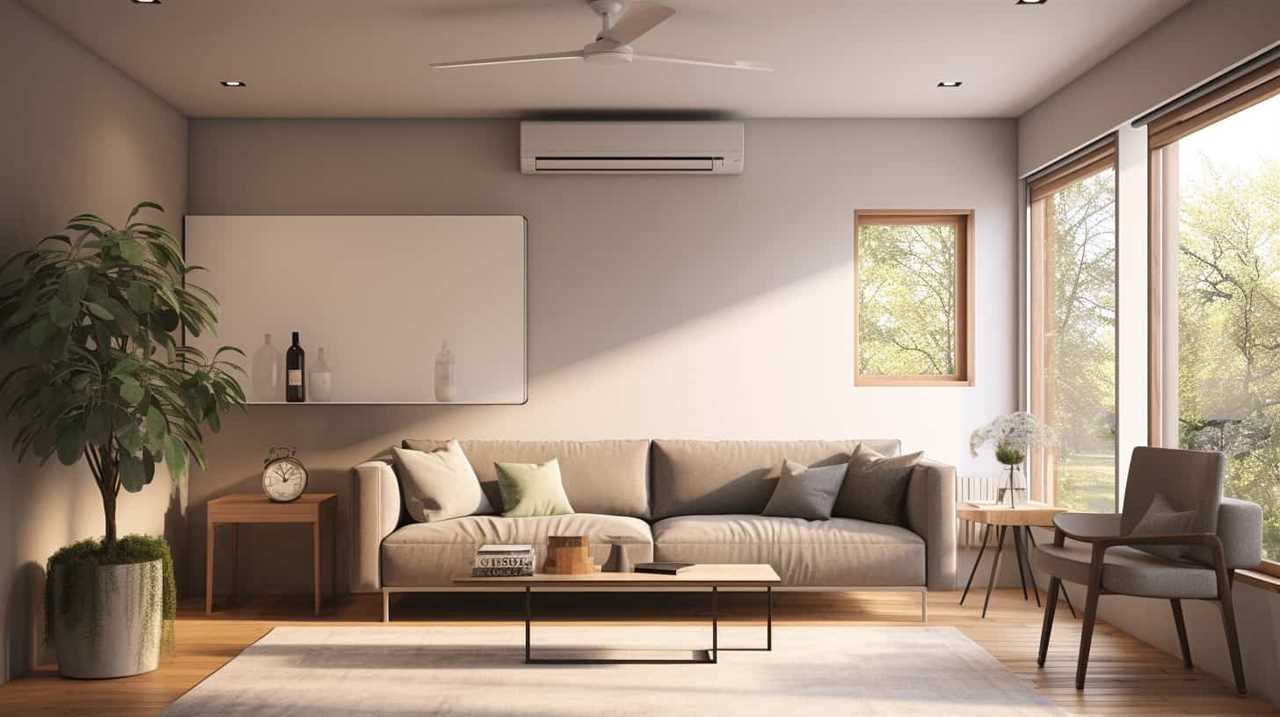
Can a Heat Pump Be Used as the Primary Heating Source in Colder Climates?
Yes, a heat pump can be used as the primary heating source in colder climates. It utilizes innovative technology to extract heat from the outside air and efficiently distribute it indoors, providing reliable and cost-effective warmth.
Are There Any Government Incentives or Rebates Available for Installing a Heat Pump?
There are government incentives available for installing a heat pump, providing significant energy savings and financial benefits. These incentives aim to promote innovation and encourage individuals to adopt more sustainable heating and cooling solutions.
Conclusion
So there you have it, folks. Installing a heat pump for AC is as easy as juggling flaming chainsaws while riding a unicycle on a tightrope. Just kidding!
But seriously, with the right knowledge and preparation, you can successfully install a heat pump and enjoy efficient cooling in your home. Remember to assess your cooling needs, choose the right size, and follow the step-by-step installation process.
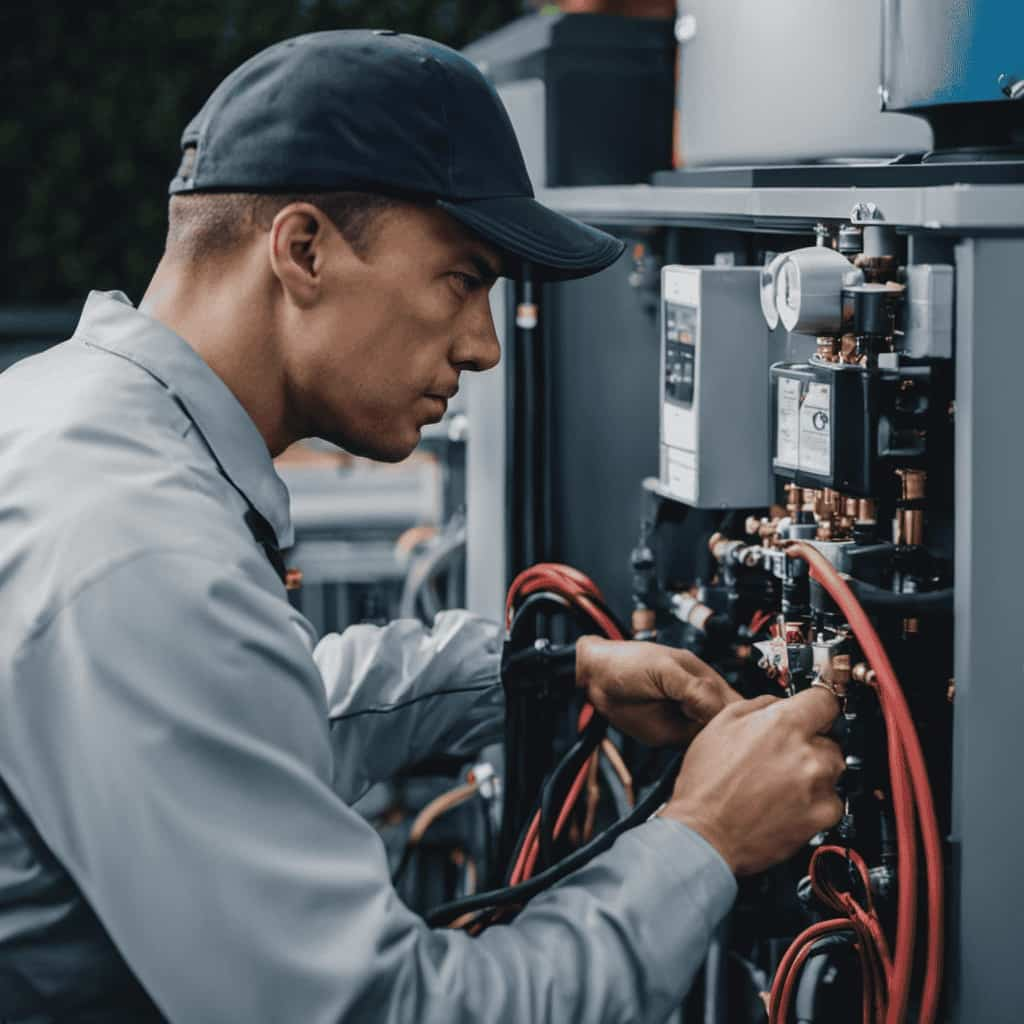
It’s like a thrilling rollercoaster ride, except without the screams and the fear of plummeting to your doom.
Happy cooling!
-

 Residential and Commercial Applications3 months ago
Residential and Commercial Applications3 months agoBest Amana Heat Pump Reviews
-

 Thermal Energy Transfer3 months ago
Thermal Energy Transfer3 months agoBreakthroughs in Modern Heat Pump Systems: Thermal Energy Edition
-

 Residential and Commercial Applications3 months ago
Residential and Commercial Applications3 months agoBest Heat Pump
-

 Geothermal Heat Pumps2 months ago
Geothermal Heat Pumps2 months agoUpgrade Your Comfort with Our Efficient HVAC Systems
-

 Geothermal Heat Pumps2 months ago
Geothermal Heat Pumps2 months agoInnovative Geothermal Heat Pump Manufacturers Revolutionize Energy Efficiency
-

 Air Conditioning4 weeks ago
Air Conditioning4 weeks agoExploring Energy-Efficient Air Conditioning Heat Pumps
-

 Thermal Energy Transfer3 months ago
Thermal Energy Transfer3 months agoBoost Your Heat Pump Efficiency: Interactive Guide
-

 Residential and Commercial Applications3 months ago
Residential and Commercial Applications3 months agoBest Portable Heat Pump Heat & AC











